



Skip the seasonal hiring scramble! Start as early as possible and follow this guide to help make it easier to build your seasonal team - with tips to staff up fast and smart.
Download the checklist today.











Skip the seasonal hiring scramble! Start as early as possible and follow this guide to help make it easier to build your seasonal team - with tips to staff up fast and smart.
Download the checklist today.







We’re more than just a property restoration company...
We’re an integral part of the communities we serve. PuroClean Franchise Owners bring peace of mind to those in need while building a business to be proud of. Join our network of dedicated professionals, united in service and collaboration, to support each other and make a meaningful impact.
I’ve always been passionate about business and making a positive impact in my community. PuroClean was the perfect fit, allowing me to assist those in crisis while building a business based on integrity, service, and growth.
Joseph Ortiz, U.S. Army Veteran PuroClean of Reston & San Juan




www.PuroCleanFranchise.com





EDITORIAL
Cochinwala,
Associate
Jennifer
Editor-in-Chief Courtney
MARKETING
Creative
Graphic
Catherine Marinoff

ADVERTISING
Advertising
Carly
Technology
Sara Williamson
Manager,

As we continue to navigate a world marked by both uncertainty and opportunity, one thing remains constant: the resilience and innovation of the franchise community.
In recent months, I’ve had the opportunity to travel to both Canada and the United Kingdom, meeting with business owners, entrepreneurs, and franchise leaders who — despite facing different political and economic climates — share a common commitment to growth, job creation, and local investment. Their experiences reinforce what we know to be true here at home: franchising works, and when done the responsible way, it can work for anyone.
And next, IFA will convene our annual Legal Symposium and IBA/IFA Joint Conference in Washington, DC, at such a pivotal time in the nation’s capital and for businesses everywhere. We will also launch our first-ever World Franchise Show in Miami — a new and reimagined type of franchise expo — showcasing top brands, offering expert educational content from franchising greats, and providing one central location for prospective entrepreneurs to learn and connect.
At the International Franchise Association, our mission has never been more important. As political and economic challenges persist both globally and domestically, IFA is front and center — amplifying your voices, advocating for policies that protect our model, and defending the right to own and operate a business. Whether it’s the battle against over regulation or the push for policies that promote workforce development and small business growth, we are leading the charge to ensure franchising not only survives — but thrives.
At the same time, we continue to tell the story of franchising. From industry-leading research to media engagement to our growing network of local advocates, IFA is making sure that policymakers and the public understand the powerful role franchise businesses play in their communities.
None of this is possible without you. Your engagement, your stories, and your support make our advocacy stronger and our message louder. As we experience another consequential year, I encourage you to stay connected, get involved, and continue to lean on this community. Because when franchise businesses stand together, we’re not just a powerful economic force — we’re a movement.
Thank you for all you do.
Sincerely,
Matt Haller President & CEO International Franchise Association
The International Franchise Association protects, enhances and promotes franchising.
The preeminent voice and acknowledged leader for franchising worldwide.
Mary Kennedy Thompson, CFE BNI Chair
Sam Ballas, CFE East Coast Wings + Grill and Sammy’s Sliders Vice Chair
Gary Robins The G & C Robins Company Second Vice Chair
Steve Hockett Great Clips Immediate Past Chair
Bill Hall, CFE Treats Investment, LLC Treasurer
Ron Feldman, CFE ApplePie Capital Chair, IFA Foundation Board of Trustees
Catherine Monson Propelled Brands Vice Chair, IFA Foundation Board of Trustees
Tushaar Agrawal Marriott International
Jerry Akers Great Clips & The Joint
Tiffany Atwell Ecolab
Tom Baber IHOP / Money Mailer
Marcus Banks Wyndham Hotels and Resorts, Inc.
Mitch Cohen Jersey Mike’s Subs; Sola Salon Suites
Ashley Coneff Inspire Brands
Adam Contos, CFE Area 15 Ventures
John Crawford Jani-King International, Inc.
Randy Cross, CFE Fish Window Cleaning
Kimberly Crowell Kalo Companies
Steve Danon Restaurant Brands International
Emma Dickison, CFE Home Helpers Home Care
Jay Duke BDO USA, LLP
Lynette Eaddy Smith Chick-fil-A, Inc.
Clint Ehlers FASTSIGNS of Willow Grove, PA and Cherry Hill, NJ
Tim Evankovich Oasis Senior Advisors Franchise System, LLC
Shane Evans, CFE
Heights Wellness Retreats (Massage Heights Franchising)
Sean Falk, CFE
Just for Your Paws, LLC
Rocco Fiorentino, CFE Benetrends Financial
Greg Flynn Flynn Restaurant Group
Nate Garn
Sizzling Platter
Michael Gonda McDonald’s
Matt Haller IFA (Non-Voting)
Daniel Halpern Jackmont Hospitality
Dustin Hansen , CFE InXpress
Jon Hixson Yum! Brands
Harvey Homsey, CFE Express Services, Inc.
Earsa Jackson , CFE
Clark Hill Strasburger
Tam Kennedy Twin City TJs
Jesse Keyser Keyser Enterprises
Aslam Khan
Falcon Holdings
Lillian Kirstein 7-Eleven
Rolf Lundberg Choice Hotels International
Ned Lyerly, CFE Starheel Ventures
Dennis Maple Goddard Systems, LLC
Dave Mortensen Purpose Brands, LLC
David Ostrowe
O&M Restaurant Group
Caroline Oyler Papa John’s
Sarah Powell GoTo Foods
Todd Recknagel
PCRK Group, National Envy Development
Laura Roberts, CFE Bojangles’ Restaurants, Inc.
Rob Branca Branded Management Group, Inc. Chair, Franchisee Forum
Robin Gagnon, CFE We Sell Restaurants Chair, Franchisor Forum
Marcia Mead M Squared Franchise Consulting Chair, Supplier Forum Advisory Board
Meg Roberts, CFE
Head to Toe Brands
Al Rodriguez Sport Clips
Azim Saju Ark Holdings Group
Jyoti Sarolia, CFE Ellis Hospitality Group
Karen Satterlee, CFE Hilton Worldwide Holdings, Inc.
Heidi Schauer
The Wendy’s Company
Abby Schmidt Paychex
Michael Seid, CFE
MSA Worldwide
Stephen Shields Express Employment
Omar Simmons
Exaltare Capital Partners
Richard Snow Bremer Bank
Christine Son Dine Brands Global
Jeffrey Sopp
Kensington Hill Partners
John Teza Hand & Stone Franchise, LLC
Carolyn Thurston, CFE
Wisdom Senior Care
Larisa Walega , CFE Ziebart International Corporation
Charles Watson, CFE
Steve White
PuroClean
Tim Williams
Williams Fried Chicken
Gabby Wong
FranConnect
Tony Zaccario
Stretch Zone


Jim Howe (former president of Propelled Brands’ company NerdsToGo) has been appointed president of FASTSIGNS

Ascent Hospitality Management has appointed Blain Shortreed as chief operating officer.

Alexandra White has been promoted to vice president of medical operations for QC Kinetix

Empower Brands has appointed Felicia Reeves as chief marketing officer.

Franchisee Bret Lyman has taken over ownership of two Always Best Care franchises in Provo and St. George, Utah. Lyman joins Always Best Care with more than 25 years of medical and direct care experience, having served as a registered nurse prior to joining the agency. He is currently the owner of an assisted living facility, a valuable role that will provide insight and complement his senior care skills as the new owner of Always Best Care of Utah County and St. George. His extensive background includes CNA in home health, assisted living and skilled nursing experience, including pediatric, orthopedic, surgical, ICU, and skilled nursing. Lyman is also a university educator with nearly 20 years of teaching experience. “Taking on the responsibility of leading two Always Best Care franchises is a highly rewarding opportunity for me and my team,” said Bret Lyman.
Re-Bath has a new three-territory agreement to bring its highquality, convenient services to the Washington, D.C. metro area. With Virginia and Maryland ranked among the nation’s fastest-growing states for franchise unit growth, new franchisee Kourtnie Perry-Calhoun sees this market as a prime opportunity to leverage her decades of marketing and management experience and introduce one of America’s largest bathroom remodelers to new customers.

Neighborly has appointed Reese Neumann to the newly created role of chief growth officer.
BNI (Business Network International) is bringing franchise opportunities back to the U.S., creating new pathways for entrepreneurial success and small business growth. “This is an exciting moment for entrepreneurs who want to make a real impact in their communities,” said Mary Kennedy Thompson, CEO of BNI. “With franchise opportunities returning to the U.S., business leaders now have the chance to take charge of their future, build thriving professional networks, and drive lasting economic success.
BNI is more than a business — it’s a movement of shared success and community-driven progress.”
BNI franchise ownership provides entrepreneurs and business leaders with access to a globally recognized brand, a time-tested business model, and comprehensive training, coaching, and marketing support.
Moran Family of Brands (Mr. Transmission, Milex Complete Auto Care, Turbo Tint, Alta Mere, Multistate Transmissions, and Dr. Nick’s Transmissions) proudly boasts a total of seven new franchises awarded and two resales in the first quarter of the year.
Behind the Q1 agreements are:
• Henry Nardone signed a single-unit deal for a Turbo Tint location in Jacksonville, FL.
• Jami Grindotto signed a 3-store development agreement for co-branded Mr. Transmission – Milex Complete Auto Care shops in Albuquerque, NM.
• Christi Redfearn and David Record signed a 3-store development agreement for co-branded Mr. Transmission – Milex Complete Auto Care shops in Dallas, TX.

Sport Clips Haircuts has pledged $1 million over the next three years to the St. Baldrick’s Foundation, the largest charity funder of childhood cancer research grants. Sport Clips has now made its fourth million-dollar commitment to St. Baldrick’s, bringing its total contributions to $4.4 million since 2016. As the Foundation’s National Partner, Sport Clips Haircuts is investing in research that leads to clinical trials providing children their best chance for a cure.
In the spirit of giving back on a local level, dozens of Fish Window Cleaning franchisees throughout the United States celebrated Random Acts of Kindness week by donating services to nonprofits and deserving individuals in their community.
A&W Restaurants has strategic plans to expand the brand’s presence in Memphis, Tennessee and into the neighboring city of Millington. A&W Restaurants has four restaurants in Tennessee, all owned and operated by dedicated local franchisees committed to service, quality and growth. The brand plans to bring three new restaurants to the greater metro area of Memphis, with one opening in Millington by the year’s end.


IFA member brands MY SALON Suite and FASTSIGNS have been recognized by Franchise Business Review as 2025 Top Franchises for Women. Only 100 brands were named to the annual list of award winners.
Every February, Random Acts of Kindness week is observed as a way to encourage kindness and demonstrate how small actions can make a difference. Here are a few examples:
• Manchester, Connecticut, owner Brian Mendes offered a free window cleaning to Our Companions Rescue animal shelter as a, “thank you” to the employees there.
• Pete Hayes and his crew did something similar in Twinsburg, Ohio by brightening up the windows at Pet Guards Clinic free of charge.
• Chandler, Arizona owner Cassandra Gallegos gathered her team to spend a few hours cleaning windows at the Feed the Children warehouse. Volunteers had
been gathering supplies to ship to southern California to aid victims of the devastating fires.
• In southern California, Tom Chesney and his Lawndale employees cleaned the windows at a much-needed rental property for a family that was moving in after being displaced by the fires recently.











The IFA Legal Symposium, May 4-6, 2025, at the Grand Hyatt in Washington, D.C., is where franchise legal and business strategy successfully intersect. Show up to better understand the latest legal, regulatory, and business issues shaping franchising. For example, come learn about the new level of scrutiny on regulators and franchisors, plus
will likewise learn about operational and technological transformations and the legal ramifications of those changes facing today’s franchise businesses. And you will hear how franchising is impacted by influencer regulations, private equity consolidation, and international tax rules.
The IFA Legal Symposium has clarity woven into every session. Attend the counsel sessions to explore brand obligations, plus hear CEO updates and keynote speakers as they share ideas on boardroom level change. The Basics Track and sessions like “Intellectual Property and Registration and Disclosure” will assist those who want to build a solid educational foundation or simply need a refresher in franchise law.
“ From Capitol Hill to the courtroom, new trends in franchising are important to understand.”
The IFA Legal Symposium is where you can also unpack compliance issues and regulatory expectations. Attend the following breakout sessions, as well as others, and dive deep into these important issues:
• Antitrust: Pricing Dos and Don’ts
• Franchise Advertising and the Use of Influencers in Social Media
• Supply Chain Management in Franchise Systems
Also, you can expect candid and practical discussions about compliance at the always popular Luncheon Roundtables where business professionals and franchise attorneys facilitate discussions on compliance and other topics.
From Capitol Hill to the courtroom, new trends in franchising are important to understand. The annual Government Relations Update will cover what’s coming from Congress, the FTC, and state capitals, while the Judicial Update breaks down recent legal decisions important to all franchise attorneys. You will also find sessions on other important issues, including:
• Noncompetes and the FTC’s Proposed Ban
• Arbitration Provisions in Franchise Contracts
• International Tax and Registration Issues
Attending the 2025 IFA Legal Symposium not only enhances professional development, but attendees are also eligible to earn Continuing Legal Education (CLE) credits, including ethics credits, and Certified Franchise Executive (CFE) credits. The high-value content at the IFA Legal Symposium is recognized across the legal and franchising sectors.
One of the most valuable aspects of the IFA’s Legal Symposium is the opportunity to connect with franchise attorneys, in-house counsel, and business leaders from across the industry. Whether it is your first time attending or you are a returning attendee, there are structured and informal opportunities to build your network, share ideas, and collaborate across sectors. Networking highlights include a welcome reception, the Roundtable Luncheon (featuring both legal and non-legal facilitators), an evening networking reception, and multiple refreshment breaks. Use these touch points to strengthen your connections and your business.
The IFA Legal Symposium is built on four powerful pillars: (1) expert legal speakers — including a CEO fireside chat and first-time ever keynote speaker; (2) an always important IFA Government Relations update; (3) peerto-peer roundtables; and (4) the annual judicial update.
For an innovative program with speakers representing all key stakeholders in franchising, plan to be in Washington, D.C., May 4-6, 2025. The IFA Legal Symposium is the most critical legal education event in franchising. Whether you are a veteran legal strategist or a rising voice in franchise law, the IFA Legal Symposium delivers clarity, credibility, and community when it matters most.



The 2025 IFA Legal Symposium (May 4-6 in Washington, DC) brings together some of the brightest minds in franchising law, strategy, and leadership — and this year’s speaker line up is nothing short of exceptional.
From trusted voices in crisis communication like keynote speaker Michael Maslansky to powerhouse legal experts such as Heather Perkins, and Jorge Mondragon, the IFA Legal Symposium offers a deep dive into the most pressing issues facing the franchise world. With additional insights from industry leaders like Mary Kennedy Thompson, and FTC Director Chris Mufarrige, this year’s event sets the stage for meaningful dialogue and forward-thinking solutions in franchising’s evolving legal landscape.

Michael Maslansky is that political consultant who gets right to the heart of an issue; that lawyer who found a way to be both clear and meticulously accurate; that entrepreneur wizened by boom and bust; that behavioral scientist who deeply understands how the brain works… wrapped into one guy.
Since writing “The Language of Trust” in 2010, Michael Maslansky has become one of the leading experts on reputation and crisis communication in the world. He has served as a senior advisor to Wells Fargo, Kaiser Permanente, Procter & Gamble, Toyota, Bank of America, PepsiCo, Johnson & Johnson, and Pfizer, among others, and has helped industry associations in financial services, energy, and personal care navigate major industry transformations and crises. He is a graduate of the University of Pennsylvania and Columbia Law School.

With 30 years in franchising, Mary Kennedy Thompson has supported businesses of all sizes and has extensive experience in global expansion, leadership, and integrations. Prior to starting at BNI in 2024, Mary served as Chief Operating Officer at Neighborly, the world’s largest home services company, where she worked since 2006. Her tenure at Neighborly included roles as Executive Vice-President and President of Mr. Rooter.
Chris Mufarrige served in the first Trump Administration as a Senior Adviser to the Director and Deputy Director of the Consumer Financial Protection Bureau, advising on enforcement, rulemaking, and supervisory exams relating to the country’s largest banks and nonbank financial institutions. Most recently, he was Commissioner Melissa Holyoak’s Chief of Staff and Attorney Adviser. He has also worked at private law firms and as an in-house lawyer. In his free time, Mufarrige taught a class on financial services and consumer protection at George Mason University’s Antonin Scalia Law School.

Heather Perkins is a litigation partner in the Denver office of Faegre Drinker Biddle & Reath. She specializes in complex litigation, with deep experience in franchise and distribution and trade secret advising and litigation. Heather currently serves as an Executive Partner for the firm and served previously as a member of the firm’s board and the managing partner of the Denver office. She is an at-large member of the Governing Committee of the American Bar Association Forum on Franchising, where she serves as liaison to the Women’s Caucus. She currently serves on the University of Colorado Law Alumni Board and is the immediate past chair of the Colorado Legal Aid Foundation Board of Trustees, for which she served as chair from 20212023. She is Chambers ranked in commercial litigation. She previously served as editor in chief of The Franchise Lawyer and as an articles editor and an associate editor for The Franchise Law Journal. Heather graduated with honors from the University of Colorado School of Law, after which she served as a judicial law clerk for a federal judge in Colorado before going into private practice. Prior to law school, she practiced as a CPA in Colorado and Chicago.
Megan Center is a distinguished attorney who focuses on transactional franchise law, corporate governance and mergers and acquisitions (M&A). With over a decade of dedicated experience, Megan provides comprehensive, results-oriented legal counsel to franchisors across diverse industries, guiding them through every stage of the franchise lifecycle. Megan advises clients on:
• The strategy and structure of franchise programs, as well as counseling on corporate formation, governance and M&A transactions.
• Preparing and maintaining franchise disclosure documents (FDD.)
• Drafting and negotiating complex franchise transactional documents.
• Ensuring compliance with state and federal franchise regulations.
• Day-to-day franchise system management, including renewal, termination, transfer, supply and relationship issues, and operational changes.
• Franchise system acquisitions and sales, including sales to, or purchases by, private equity.
• Systems designing alternatives to franchising.
As co-chair of the IFA Women’s Franchise Network, Megan is deeply committed to fostering growth and leadership within the franchise industry. She is an active member of the IFA Women’s Committee and the American Bar Association Forum on Franchising. Megan’s client-centric approach combines strategic legal counsel with a profound understanding of the franchise business model. She is dedicated to proactively addressing legal challenges, helping franchisors mitigate risks and focus on sustainable, long-term growth.

Hear from these speakers and more by registering for the IFA Legal Symposium today! franchise.org/legal-symposium
Jorge is partner of the corporate practice. He brings over 31 years of experience, where he has developed a legal and commercial business-oriented practice with a focus on corporate, commercial, franchising, licensing, distribution, technology, and business retail matters. His experience includes advising Mexican and foreign clients on the full spectrum of transactions –from start-ups mechanisms to the correct management and operation of their business. His practice also entails compliance, regulatory, corporate and intellectual property aspects required for the implementation of franchise systems and distribution schemes.
Jorge also has vast knowledge of complex corporate and commercial matters, including mergers and acquisitions, corporate reorganizations, strategic alliances and joint ventures, corporate controversies and foreign investments.

In October 2023 Jorge was named Chairman of Multilaw, one of the world’s largest international professional services network of independent law firms. Established in 1990, Multilaw covers over 90 firms across 100 countries. These firms are made up of more than 11,000 lawyers.
Zev Eigen is the Senior Director of data science. In this role, he tests clients’ commercial algorithms for bias and disparate impact in light of regulatory standards and ethical principles.
Zev Eigen is the Senior Director of data science. In this role, he tests clients’ commercial algorithms for bias and disparate impact in light of regulatory standards and ethical principles.

Before joining DLA Piper, Zev developed technology centering on pay equity, second-chance hiring, and AI dispute resolution. As a strategic advisor, Zev focused on developing and testing models and systems to de-bias AI and to help ensure compliance with laws and regulations, with a focus on wage-and-hour class actions.
Zev previously served as in-house labor counsel at a global media/entertainment company. Zev was an Irving S. Ribicoff Visiting Professor of Law at Yale Law School, a visiting Associate Professor of Law at NYU School of Law, and an Associate Professor of Law at Northwestern University School of Law with a joint appointment at the Kellogg School of Business.

By Joyce Mazero, Josh Goldberg, and Alissa Chase, Polsinelli

The current tariff increases and volatility are creating challenges.
In April 2025, President Trump implemented new “reciprocal” tariffs, introducing a 10 percent additional tariff on goods from most countries, and significantly higher rates for goods from countries with which the US has the largest trade deficits, as set out in Annex I.
As of April 9, 2025, there is a 90-day pause on the increase in reciprocal tariffs for all countries with reciprocal tariff rates above 10 percent, except for China. During that 90-day period, the original 10 percent reciprocal tariff rate will remain in effect. China is now subject to an increased 125 percent reciprocal tariffs, in addition to the 20 percent IEEPA tariffs already imposed in February/ March of this year — bringing the total tariffs imposed on goods from China to 145 percent. China retaliated by imposing a 125 percent tariff on US goods entering China. Earlier executive orders from February/March imposing 25 percent IEEPA tariffs on non-originating imports from Canada and Mexico (i.e., goods that do not qualify for United States Mexico Canada Agreement (“USMCA”) duty preference) are still in effect. However, energy or energy resources and potash imported from Canada and not qualifying as originating under the USMCA are presently subject to the lower additional tariff of 10 percent. Applicable rules of origin which may exempt a certain good under USMCA vary on a case-by-case basis and may be eligible to be exempt from the IEPPA tariffs.
Many franchise-driven industries are impacted.

Restaurant franchises are among the hardest hit due to their dependence on imported ingredients, equipment, and packaging. The reciprocal tariffs on imported goods from China drives up costs for kitchen equipment like fryers or grills and technology related costs. While food imports, such as avocados from Mexico are excluded from the IEEPA tariffs (as homegrown resources) other Mexican and Canadian foods and goods may still be subject to the 25 percent tariff.

Service-based franchises are less directly exposed but still feel the pinch for goods and equipment imported, such as chemicals or equipment (e.g., vacuums from China), which now may cost more under the reciprocal tariffs. Franchises that
rely heavily on technology — such as computers, laptops, chips, or other electronics and technology from China — should closely monitor any possible tariff exemptions.

Gym franchises are grappling with significant equipment cost increases. The fitness industry imports much of its equipment from China. Membership fees might rise to compensate, but with consumer spending cautious, some gyms may delay upgrades or lean harder on domestic suppliers — though U.S. manufacturing capacity for fitness equipment remains limited.

The automobile dealership industry depends heavily on parts and manufacturing from China, Mexico, and Canada and these tariffs could have a significant impact on U.S. dealers. Retail franchises will be hit hard by the tariffs on China, with many products — tools, snacks, electronics — sourced there. The 10 percent reciprocal tariffs on imported goods from other countries (e.g., the EU) also adds pressure. Tariffs on tools and materials (e.g., lumber from Canada, steel from China) will increase project costs for all types of franchises. Service-heavy models likely will fare better, but franchises selling imported goods face supply chain squeezes.


Planning is difficult in this environment. Franchisors and suppliers saw first-hand how other “go to” countries — such as Vietnam and India — can also be subject to a vast increase in tariffs, even with the planned increase in reciprocal tariffs above 10 percent temporarily paused. Given the volatile nature of international trade, it is best to monitor each development and consider the following ways to mitigate risk:
Diversify Supply Chains: Franchisors should consider shifting sourcing away from China to Mexico or Canada, whose originating goods that qualify for USMCA duty preference are exempt from the IEEPA tariffs or partner with U.S.-based manufacturers or distributors that source and produce goods domestically to avoid paying import duties and tariffs altogether.
2
Reviewing Supply Contracts: Franchisors and franchisees should review their supply contracts to determine who bears tariffs costs and (re)negotiate terms where possible.
Negotiate Dynamic Pricing Contracts: Parties should consider negotiating dynamic pricing provisions — or include language that the parties will work in good faith to approve alternative suppliers if tariffs materially change the bargained-for contract.
Key Contract Provisions: Force majeure clauses are typically for unforeseeable events and courts have been reluctant to read in tariffs as a trigger for force majeure unless tariffs are explicitly contemplated.
Origin of Goods: Require suppliers to certify the country of origin for goods, ensuring compliance with tariff rules and avoiding penalties for misclassification. This is critical under U.S. customs law, where misstated origins can lead to fines.
Delivery and Risk of Loss: Clarify when title and risk transfer (e.g., FOB shipping point or destination), especially if tariffs delay customs clearance. This prevents ambiguity over who pays if goods are held up by new duties.

Providing legal services in the franchise field for over 40 years.

Rosen Karol Salis, PLLC, has provided the highest-quality legal services in the franchise field for over 40 years. Our firm has represented franchisors, franchisees, and franchisee organizations in all areas of franchise law. Located in New York City, we provide legal services to clients nationwide.
Our firm has represented clients in all areas of franchise law, from setting up franchising systems and programs, forming all entities, drafting, and negotiating (on all sides) franchise and multi-unit development agreements, disclosure, and other ancillary documents, as well as mediating, arbitrating, and litigating in both state and federal courts. We negotiate lease agreements and financing documents for the sale or acquisition of franchise related real estate, and handle all matters applicable to franchise transactions. Rosen Karol Salis represents franchisors and franchisees in nearly all industry fields, including restaurants, real estate brokerage, healthcare, fast food, fitness, energy, hospitality, education, health and beauty, telecommunications, senior care, courier services, apparel and many more.
Rosen Karol Salis are authors of the section on Franchise Law in the United States which appears in the Third, Fourth and Fifth Editions of the (International) Franchise Law Review. Since 2017 our law firm has written the review of franchise law in the U.S. which appears in the International Comparative Guide to Franchise Law. Rosen Karol Salis, PLLC is highest rated by Martindale Hubbell amongst franchise law firms in the U.S. Our Firm, Richard L. Rosen, John Karol, and Len Salis, have won numerous awards and honors in the field of Franchise Law.
Richard
L. Rosen
Professionalism Experience Integrity
ROSEN KAROL SALIS, PLLC
110 East 59th Street, 23rd Floor | New York, NY 10022
Tel: 212-644-6644 | Fax: 212-644-3344
Email: rlr@rosenlawpllc.com
Insurance Protection: Franchisors and franchisees manage risk by looking into insurance products such as trade disruption insurance, contract frustration insurance, and expropriation insurance.
Import Strategy Adjustments: Importing parts (of a product) separately that can be declared at a lower value and then assembling the parts in the United States may reduce overall tariff costs. A company may also want to import equipment without the software pre-installed on the equipment to bring down the value of goods to minimize duty implications and then install the software after importation.
Adjust Pricing Strategically: Franchisees can pass on some cost increases to customers via targeted price hikes — e.g., raise menu prices by 5 percent on high-demand items— rather than across the board. Pair this with value messaging (e.g., loyalty discounts) to soften pushback.



47.4
14
(Source: USDA, 2023)
Own a business that fights hunger, inspires action, and leads with impact. that fight hunger locally
Action Feeding Communities children, people in the U.S., including million million face food insecurity.
Build strong partnerships
Host meal-packing events in meaningful community impact
Engage volunteers high fulfillment

Backed by a national nonprofit with businesses, schools & churches
Low overhead, proven model, with 100M+ meals packed
a

By Amy Cheng and Allison Grow Ryan, Cheng Cohen

Franchise systems are built on consistency: franchisors, franchisees, and consumers all rely on common standards, products, and services across the brand.
So what happens to the franchisor-franchisee relationship during times of volatility? Franchise business leaders across industry sectors are planning for growing volatility in the coming months and years — be it through tariffs, labor shortages, changing consumer behavior, or cost inflation. This article looks at how those changes may impact the
franchise relationship and highlights some strategies to consider when that relationship is put under strain.
While the franchisor and its franchisees rely on the same brand, they are independent businesses with related but distinct responsibilities and revenue streams. Typically, franchisees carry the responsibility for day-to-day business operations. They manage costs; they hire employees; they pay for inventory; and they depend directly on the profitability of those operations. Franchisors, in turn, are responsible for maintaining the overall franchise system, standards, and support structure, relying primarily on franchisees’ sales and resulting royalty payments.
This model works because franchisees take pride in running their own businesses and benefit from connections to a uniform system and brand. But times of financial stress will test even the strongest franchisorfranchisee relationship. While system shocks like inflation and tariffs impact franchisors and franchisees alike, franchisees are often the first to feel the pressure to their profitability, and franchisee contractual defaults, requests for rescission, claims of franchisor
underperformance, and threats of litigation all spike when money grows tight. Regardless of the franchisor’s efforts or responsibilities, a franchisee who cannot make ends meet may not be satisfied by a franchisor’s bestin-class operations manual or a top-tier POS system.
Understanding that franchisees are the first to feel the impacts of volatility, savvy franchisors keep on top of market forces that impact franchisees and — even without a legal obligation to do so — address what they can to mitigate the strain on their franchisees. Current trends have franchisors preemptively evaluating tools to manage costs and vendor contracts.
Today’s market environment has most businesses looking at costs. Franchisors may consider creating and sharing cost-control playbooks. This could include practical tools to analyze labor and expenses or spreadsheets to calculate ROI for marketing or other investments. Some systems may partner with particularly strong franchisees or the franchisee advisory council to create or convey these tools, both to mitigate risk and to leverage those entities’ direct relevant experience. Depending on the nature and size of the system, franchisors may be able to leverage their scale to work with existing (or new) preferred vendors to alleviate franchisees’ cost burdens. While franchisors ultimately cannot dictate the costs charged by third-party vendors, in some cases they may be able to negotiate concessions or flexibility in vendor contracts. Some examples of concessions franchisors may consider negotiating include:
• Price;
• Payment terms;
• Vendor marketing contributions/incentives; and
• Vendor exclusivity.
In some cases, franchisors may also be able to provide temporary development flexibility to franchisees — such as deferring capital improvements or participation in new mandatory initiatives — without harming the overall brand. This will be a brand-by-brand decision and depend on a range of factors such as industry sector and markets served. While such flexibility can be helpful to franchisees, franchisors should document any concessions given to franchisees, and obtain a release in exchange, to ensure that temporary leniency does not lead to a long-term waiver of the franchisor’s rights and obligations to enforce system standards.
While additional franchisor support can go a long way in protecting the franchise relationship during times of volatility, it is not always sufficient. Recognizing when a relationship is no longer tenable is critical. A franchisee’s chronic underperformance, flagrant breaches of the franchise agreement, or fundamental misalignment on the value of the brand can all signal that it is time to part ways. Even if it results in a lost unit, ending a bad relationship can ultimately benefit the system as a whole. There are many ways to end a franchise relationship — some contentious and some not. On one end of the spectrum is termination followed by litigation to enforce a franchisor’s contractual rights. While this approach is necessary in some cases to protect the trademark or set an example, it can be expensive, time-consuming, and contentious. Often, franchisors and franchisees can work together on a softer exit. Buybacks, resales, and mutual walkaways — where feasible — can reduce business interruption and reputational harm. But even if a franchisor is willing or even prefers to mutually agree on a reasonable exit, the franchisee may not cooperate. Nonetheless, it is important to consider the system when negotiating the exit of one franchisee. In normal circumstances, the history of the franchisor’s business relationship with a particular franchisee, its unique P&L, and market differences can all warrant addressing franchisee exits on an individual basis. But where external forces are creating a volatile business environment for the entire franchise network, franchisors are well served by acting with consistency and predictability. In any case, franchisors should always avoid setting harmful precedents. For example, exits that waive the noncompete (where the noncompete is enforceable) or do not strictly protect the trademark may negatively impact the system.
While this article has principally looked at challenges to the franchise relationship, that relationship is also a source of strength in volatile times. Through their system-wide reach and relative financial steadiness, franchisors can often be a source of both stability and flexibility during turbulent times, helping franchisees weather difficult circumstances together far better than they could alone.


The Certified Franchise Executive™ program educates and certifies individuals and organizations in franchising to the highest standards. The members of the Class of 2025 exemplify these standards, having dedicated countless hours in pursuit of enhancing their professional skills.
Find out more about the program and get your CFE at franchise.org/cfe.















































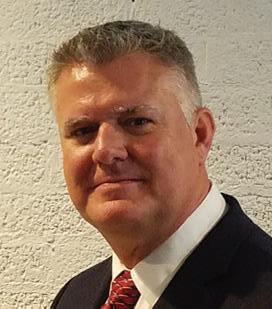




















































































Photos Unavailable
Laurie Abplanalp, CFE Streamline Brands
Nicole Amico, CFE Metric Collective
Kailee Apodaca, CFE Altitude Trampoline Park
Daniel Arabi, CFE Daddy’s Chicken Shack Franchising, LLC
Jose Ayala, CFE Dave’s Hot Chicken
Karen Blakeman, CFE Valvoline Instant Oil Change Franchising, INC.
Conway Briscoe, CFE Transitiv
Annika Brumfield, CFE Ballard Brands, LLC
Madi Calvert, CFE Primrose School Franchising Company
Danny Campos, CFE
Miguel Cezar, CFE Famous Belgian Waffle
Ryan Conrad, CFE LaundroLab, LLC
Jessica Cornelius, CFE Right At Home, LLC
Zach Fargo, CFE Trabon Group
Nick Gartner, CFE Hudson Valley Swim
John Goldasich, CFE Paige Enterprises
Emily Harter, CFE FranFund, Inc.
Evan Haynes, CFE Primrose School Franchising Company
Amanda Jennings, CFE Lightbridge Academy
Loren Johnson, CFE Inspire Brands Inc.
Jasan Julius, CFE Double J Franchising
Hollie Kohlgraf, CFE Self Esteem Brands
Charles Kowanetz, CFE ServiceMaster Brands
Matthew Lisowski, CFE EVERBOWL FRANCHISE LLC
Barbara Luciani, CFE SMB Franchise Advisors
Zoltan Lukacs, CFE
Victoria Magaldi, CFE Scenthound Franchising LLC
Rizwana Mahida, CFE Qualicare
Felipe Martinez, CFE Estrella Insurance
Mark Mazur, CFE The Honey Baked Ham Company, LLC
Jennifer Melton, CFE Curious Jane Ad Agency
Julia Moody, CFE British Swim School
Don Offner, CFE Wireless Zone
Kanan Pandya, CFE Pivotal Growth Partners
Erick Pratt, CFE BIGGBY COFFEE
Kenny Reinbold, CFE Express Employment International
Amanda Riley, CFE Panera Bread Bakery-Cafe
Amy Roberts, CFE Radiance Holdings
Raymond Ross, CFE Inspire Brands
Felicia Sanders, CFE Evive Brands/Assisted Living Locators
Becky Seiler, CFE The Wendy’s Company
Laura Shock, CFE Denny’s, Inc.
Diana Simmons, CFE Simply Cabinetry
Sarah Thompson, CFE Palm Beach Tan, Inc.
Caitlin Tierney, CFE BIGGBY COFFEE
Kelly Trim, CFE IFX Online Franchise Management Platform
Ryan Wesner, CFE LocateAI, Inc.
Aaron Williamson, CFE Kampgrounds of America, Inc.
Find out more about the program and get your CFE at franchise.org/cfe
Cathy Witt, CFE
Nicholas Woodward, CFE Pack & Send



By Tim Koch, Franchise FastLane
Franchising is a powerful engine for economic growth, allowing entrepreneurs to build businesses with the support of an established brand model.

practices, not only has Franchise FastLane been able to inspire more than 3,200 franchisees in their journeys, but we also continue to help brands expand at a healthy pace while maintaining the integrity of their business — because responsible franchising is good business.
Setting realistic expectations for growth is key to building strong franchise systems. The goal isn’t to grow fast — it’s to grow in a way that ensures franchisees are supported every step of the way. When brands expand too quickly without the right infrastructure, franchisees can feel the strain. A steady, strategic pace allows franchisors to provide the necessary training, resources, and attention to each new owner, creating a system that is built to last. Growth should be ambitious to a certain extent, but it should also be sustainable.
“
The strongest partnerships happen when both sides — franchisors and franchisees — are aligned in their expectations, values, and commitment to the brand.”
However, responsible franchising is what ensures long-term growth for franchisors and successes in local markets for franchisees. Responsible franchising is actually more common sense than you might think. Rather than adding more regulation or red tape, it’s about fostering an industry where all parties participate in good faith, uphold their commitments, and operate with transparency and respect. When franchisors and franchisees play fair, follow proven systems, and prioritize sustainable growth, they create thriving businesses that benefit everyone involved.
At Franchise FastLane, we take this responsibility seriously. Our approach to franchise development is rooted in three core principles: setting realistic expectations for growth, finding the right franchise partners, and ensuring brands have the systems in place for scalable sustainability. These guiding principles align with those of the International Franchise Association (IFA), which champions transparency and due diligence as the foundation of a strong franchise model. By following these best
Finding the right franchisor partners is just as important as setting realistic growth expectations. Not every business is ready to franchise, and not every franchise is positioned for long-term success. The strongest partnerships happen when both sides — franchisors and franchisees — are aligned in their expectations, values, and commitment to the brand. A great concept isn’t enough; a franchisor needs to have the right mindset, systems, and processes to support its owners. A goal for us is to work with brands that see franchising as a long-term investment, not just a way to scale quickly. Ensuring franchisors have the infrastructure in place for scalable sustainability is what allows a brand to truly support its franchisees. Training, operational processes, and ongoing guidance all need to be in place before rapid expansion happens. When franchisees have access to well-documented systems and strong support, they’re better equipped to run their businesses successfully. A strong foundation like this creates an environment where franchisees can thrive and grow.

The IFA has long set the standard for responsible franchising, providing a framework that helps franchisors and franchisees build strong, lasting partnerships. At its core, responsible franchising is about setting clear expectations, fostering transparency, and ensuring that both parties are positioned for success from the start. One of the most important aspects of this is the pre-sale period, where franchisors should provide prospective franchisees with thorough disclosures — including key financial details like those found in Item 19 of the Franchise Disclosure Document (FDD). Transparency at this stage ensures that franchisees understand the business model, including potential earnings, costs, and long-term obligations, reducing the risk of misalignment down the road.
Beyond clear disclosures, proper due diligence and validation are essential in the franchise sales process. Responsible franchising should be about making sure the right people are stepping into the right opportunities for them. Franchisors should be vetting candidates for financial capability, cultural fit, operational readiness, and long-term commitment. Likewise, prospective franchisees should be validating the brand by speaking with current operators, researching the business model, and ensuring it aligns with their own goals. A strong match on both sides leads to a healthier, more productive franchise system.
Once a franchisee is on board, the focus shifts to execution and support. A franchisor has an obligation to provide training, operational tools, and ongoing guidance to help franchisees succeed. In return, franchisees should respect the brand’s model, follow its systems the way that they are intended to be followed, and contribute to the strength of the network as a whole. Unit economics play a critical role here — franchisors need to ensure fair pricing on essential goods and services, helping franchisees remain profitable while protecting the integrity of the brand. Collaboration is another key pillar of responsible franchising. Advisory councils, where both franchisors and franchisees have a seat at the table, provide a structured
way to address concerns, improve operations, and adapt to changing market conditions. Independent franchisee associations can further support this balance, ensuring that franchisees have a voice in the system. Open communication between both parties is essential to a thriving franchise network — one where everyone is working toward the same goal of sustainable, long-term success.
At the end of the day, responsible franchising is about more than just rules and frameworks — it’s about creating an environment where both franchisors and franchisees can succeed alongside each other. Growth should be intentional, partnerships should be built on mutual trust, and systems should be in place to ensure long-term stability.
“
When franchisors and franchisees play fair, follow proven systems,
and prioritize sustainable growth, they create thriving businesses that benefit everyone involved.”
At Franchise FastLane, we take this responsibility seriously, that is why we offer two unique franchise development paths: CarPool and FastLane. Our CarPool program is a coaching and administrative program for brands that want to grow at their own pace while keeping their development in-house. Through it, we provide franchisors support in lead qualification, compliance, creative assets, and access to educational resources such as our MasterCoaching, MasterClass and MasterMind courses. FastLane is a full-service franchise development program that handles everything from conference attendance and marketing to portal updates and administrative backend support. This option allows brands to focus on franchisee success and business growth. With this path, we offer Brand Health Assessments for assured responsible scaling. By prioritizing responsible expansion, we help strengthen the franchise industry and create lasting opportunities for business owners.

Tim Koch has over 20 years of operations experience and is the president & COO of Franchise FastLane, where he drives operational excellence through strategic franchise growth every day. For more information about IFA supplier member Franchise FastLane, please visit franchise.org/suppliers/franchise-fastlane/.

By Mark Montini, QC Kinetix

The term “responsible franchising” is used frequently in the industry, and as the franchising environment continues to scale and change, franchisors need to adjust their business models to ensure they are operating ethically while meeting the demands of both franchisees and consumers.
When franchisors take the time to practice responsible franchising, they are setting themselves and their entire system up for long-term success.
Responsible franchising means building a business model where the success of the franchisor is earned through the success of the franchisees. It’s about creating long-term value, not just short-term wins. Responsible franchising also means being proactive — identifying issues early, having the courage to fix them, and always prioritizing sustainable growth. I often say: you can’t build a successful franchise without successful franchisees. That’s not just a philosophy — at QC Kinetix, it’s become our operating principle. Ethical franchising starts with alignment, transparency, and mutual accountability. Franchisees deserve to know exactly what they are investing in, what kind of support they can count on, and how decisions are made that impact their business. In order for a franchise system to thrive, franchisees need to trust your model, and when you’ve lost the trust of franchisees, you need to be intentional about gaining it back. This process of building and rebuilding trust begins with over communicating and listening. It’s important that franchisees have a clear understanding of their responsibilities in driving their own success, and having open lines of communication helps to establish that understanding. It’s also critical to invite honest feedback, because it can help you to identify areas for improvement.
Action is crucial, don’t serve your system with platitudes. Rather, lay out your plan and expectations for franchisees, and hand them the tools to make necessary changes and succeed.
Taking the time to reset when necessary allows your brand to cast a clear vision for the future and become a stronger, more sustainable model. Our core values at QC Kinetix are Relentless Progress, Fearless Service, and Bold Positivity, and we hold ourselves and our entire network accountable to these values and standards. At the end of the day, ethical franchising isn’t just about fairness — it’s about clarity, commitment, and consistency from both sides.
As brands begin to scale, one of the biggest challenges is balancing growth with support. It’s tempting to focus on top-line expansion, but responsible franchising means putting the right systems, people, and infrastructure in place first.
At QC Kinetix, we experienced rapid early growth, but when things got tough, that growth exposed gaps. Since stepping into this role, my focus has been on transformation — rebuilding our support infrastructure, upgrading training, centralizing key services, and ensuring our franchisees have the tools they need to succeed. We’re not perfect, but we’re making measurable progress every day. Recognizing vulnerability and admitting to imperfections is another way we’ve strengthened trust with franchisees. Franchisors need to view their role as helping franchisees build asset value, and building a strong foundation for franchisees and continuous education are two ways to ensure they are adhering to your brand’s standards for long-term success.
Top-line growth is exciting, and profitability is critical for survival, but combining those with a strong brand that resonates with consumers is what creates generational wealth. When franchisees win, the entire system wins, and in building a strong franchisor we are providing better tools and training for franchisees to continue winning.
Tapping into data and truly becoming a data-driven brand is key in being a responsible franchise, regardless of the industry you are in. We’ve invested hundreds of thousands of dollars into evidence-based data collection and clinical practices to ensure that everything we do is built around real data, driving optimal outcomes for our patients. As the largest regenerative medicine practice in the U.S., we generate multiple times more clinical and operational data than anyone else in this
space. That scale gives us a massive edge — and if we continue to leverage it effectively, it will only extend our leadership in what we call the Regenerative Revolution. Scaling doesn’t mean cutting corners — it means scaling responsibly. That’s the new playbook at QC Kinetix.

Building consumer trust is just as important as building franchisee trust. Responsible franchising is responsible care, and every franchise system, in every industry, should have protocols in place to ensure that each location is adhering to the same standards so consumers are receiving the same experience.
“
Responsible franchising means building a business model where the success of the franchisor is earned through the success of the franchisees.”
While these resources can translate to any industry, when working in medicine specifically, we are dealing with vulnerable patients who have turned to us for pain treatment, so we’ve established clinical protocols based on the best available evidence. Alongside requiring a strict adherence to these protocols, we also invest in ongoing education, quality control, and centralized oversight to ensure consistency. Our goal is for patients to have the same high-quality, trustworthy experience — no matter which QC Kinetix location they visit.
In a word, don’t wait until there’s a problem to act responsibly. By building your systems, culture, and values around long-term franchisee success from day one, you’ll be able to own and face challenges head on, creating a more resilient franchise system. As a leader, listen more than you speak, and above all, lead with vision and integrity.

Mark Montini is the CEO of QC Kinetix. Appointed in 2024, Mark is a seasoned franchising expert committed to ensuring QC Kinetix maintains its position as the #1 regenerative medicine practice in the United States. Renowned for pioneering innovative strategies and leveraging data-driven insights, he has worked to transform QC Kinetix by enhancing patient care, expanding market reach, and leading a cultural transformation that has set new benchmarks for success. For more information about IFA franchisor member QC Kinetix, please visit franchise.org/franchise-opportunities/qc-kinetix/
Seasonal employment can be a game changer for businesses during peak times. Whether you’re hiring additional staff for the holiday season, managing tourist influxes during summer, or finding extra hands for tax preparation in the spring, seasonal workers can help meet demand and drive operations smoothly. However, employing temporary staff isn’t just about filling vacancies—it comes with specific legal obligations and challenges that every business owner or HR professional should understand. This guide helps break down what seasonal employment is, the laws and regulations that may be applicable, and tips for hiring
seasonal employees the right way.
Seasonal employment refers to temporary work positions created and filled to meet heightened business needs during specific times of the year. These positions typically last for less than 6 months and may involve roles in industries like retail, hospitality, agriculture, and accounting. Depending on the nature of your business and the industry you operate in, effectively building and maintaining a seasonal workforce that expands and contracts over the calendar year may save you time, money, and resources.
It’s helpful to understand the distinction between a seasonal employee and a seasonal worker, as defined by two distinct federal bodies:
Employee (IRS definition): An individual who works for 6 months or fewer, typically during the same part of the year, such as the holiday or summer season. Seasonal employees may be subject to employer health responsibilities under the Affordable Care Act (ACA) if specific thresholds are met.
Worker (Labor Department definition): An individual performing labor on a seasonal basis, such as employees hired during retail holiday surges or agricultural harvest months. This classification often affects whether the employer falls under ACA requirements based on the size of the workforce.
Compliance with federal, state, and local laws is essential when hiring seasonal employees. Below are some of the key
regulatory requirements:
• Minimum Wage for Seasonal Employees
Employers must pay nonexempt seasonal employees at least the federal minimum wage, which is currently $7.25 per hour, or a higher state or local minimum wage if applicable.
• Overtime for Seasonal Employees
Under the Fair Labor Standards Act (FLSA), nonexempt seasonal employees are entitled to overtime pay—1.5x their regular rate of pay for all hours worked over 40 in a workweek. More protective state laws may exist.
• Child Labor Laws
Some of your seasonal employees may be under 18. Federal laws limit the number of hours these minors may work and prohibit their employment in hazardous roles. While these restrictions may vary depending on the industry, additional information is available from U.S. Department of Labor website and applicable state department of labor websites.
• Federal Family and Medical Leave Act and Other Paid Leave
Seasonal employees generally do not qualify for FMLA unless they:
• Work for a covered employer;
• Have worked for at least 12 months (not necessarily consecutive) as of the date the FMLA leave is to start;
• Have worked for at least 1,250 hours for the employer during the 12 months immediately preceding the leave; and
• At the time leave is requested, work at a location where the employer employs at least 50 employees within 75 miles of that worksite as of the date when the employee gives notice of the need for leave
Seasonal employees may, however, be covered under certain state or local paid family or sick leave laws.
• Tax Withholding Seasonal employees are subject to the same tax withholding and reporting rules as full-time employees This includes Social Security, Medicare, and income taxes.
• Jurisdictional Variations State and local laws may impose additional protections for seasonal employees, such as predictive scheduling rules for employees. Always review the laws that apply in your state.
workers as independent contractors instead of as employees—can lead to significant legal penalties for businesses. Employers must provide accurate classifications to ensure:
• Adequate tax withholdings
• Compliance with wage and labor laws
• Appropriate benefit entitlements
Remember: Proper worker classification is what could make or break your business. Failure to classify workers correctly could result in fines, back pay, and reputational damage.
Don’t leave compliance up to chance! Explore Paychex Hiring Services & Solutions to simplify hiring and onboarding, employee classifications, and more. IFA members can receive a discount. go.paychex.com/ifa
Misclassification Risks and Legal Consequences
Misclassifying seasonal staff— such as classifying these


By Steve White, PuroClean

In an industry built on trust, integrity, and community support, responsible franchising is not just a business strategy — it’s a core value that defines who we are at PuroClean.
Guided by the principles of Servant Leadership, Extreme Ownership, and Active Collaboration, we’ve built a model that places Franchise Owner success at the forefront. As a “franchisee first franchisor,” we understand that our success is directly tied to the success of our Franchise Owners. This philosophy has not only fueled our growth here at PuroClean but also reinforced our reputation as a company committed to ethical and responsible franchising.
Responsible franchising has recently seen a surge in importance over the last year, but it’s not a new idea by any means. At PuroClean, responsible franchising means putting our current Franchise Owners first. We believe that a strong franchise network starts with strong Franchise Owners, and this philosophy has been at the heart of our brand.
“
We
believe that a strong franchise network starts with strong Franchise Owners, and this philosophy has been at the heart of our brand.”
My commitment to responsible franchising spans my entire career — going back to my early days at Domino’s Pizza, where I saw firsthand how ethical leadership drives long-term success. Alongside our Leadership Team, I have been advocating for responsible franchising for more than a decade, and together, we have made it our mission to foster an environment where our Franchise Owners can thrive. These lessons have translated into a franchise model that not only supports business growth but also upholds high ethical and operational standards.

A key element of responsible franchising is ensuring that every PuroClean Franchise Owner is equipped for long-term success. We achieve this by providing comprehensive training and a multi-faceted support system that includes ongoing education and strong mentorship programs. Our training program is extensive and continuously evolving. Every franchise must obtain industry certifications, and we provide the education to earn and maintain these credentials. We actively seek feedback from each training class, using insights from Franchise Owners and technicians to improve the experience for future training — ensuring the information remains directly relevant to their success while continuously improving training effectiveness.
From the moment a new Franchise Owner joins our system, they are paired with a mentor to guide them through the early stages of their business. This mentorship program, combined with the support of our broader franchise network, creates a collaborative community where Franchise Owners can share best practices, learn from one another, and grow together.
Unlike many industries, restoration services remain essential regardless of economic conditions. However, unexpected business disruptions — whether natural disasters or unforeseen challenges — can also impact our Franchise Owners. When difficulties arise, we stand beside our Franchise Owners, providing the guidance and resources they need to navigate uncertainty. Our unwavering commitment to their success ensures they never face obstacles alone, allowing their businesses to remain resilient.
Leading by example is a fundamental part of our culture at PuroClean, not just within our franchise network but also in the communities we serve. Our corporate headquarters in Tamarac, Florida, is deeply engaged in community initiatives, setting a precedent for our franchises to follow.
Through our PuroClean Cares® program, we encourage Franchise Owners to give back annually through community-based campaign initiatives, including:
• National Superhero Day (March-April): Recognizing first responders and local community heroes.
• Adopt A Classroom (May-August): Uplifting teachers across America who give back to our students every day.
• Season of Giving (October-December): Supporting families and individuals in need during the holiday season.
At PuroClean, responsible franchising is not just about operational support — it’s about maintaining the highest ethical standards across our entire network. While each franchise is independently owned and operated, we foster a culture of transparency and accountability.
While each franchise is independently owned and operated, we foster a culture of transparency and accountability.”
Our franchise recruitment process is built on honesty and openness. We provide prospective Franchise Owners with full access to current Franchise Owners, allowing them to gain firsthand insight into the business before making a commitment. Prospective Franchise Owners also undergo a thorough review by our senior leadership team to ensure alignment with our values and mission. We aren’t selling franchises at PuroClean — we’re awarding them.
We also take an active role in industry regulatory organizations to ensure compliance with best practices. Our Chairman & CEO, Mark W. Davis, serves on the board of the Restoration Industry Association (RIA), and our Director of Training, Darren Hudema, WLS, is on the board of the Institute of Inspection Cleaning and Restoration Certification (IICRC). These affiliations enable us to bring the highest industry standards to our Franchise Owners.
Looking ahead, we remain committed to evolving and enhancing our approach to responsible franchising. Our long-term success will always be rooted in the well-being and prosperity of our Franchise Owners.
The future of responsible franchising at PuroClean is centered on:
• Continued Innovation – Leveraging new technologies and processes to enhance support and training.
• Stronger Franchise Owner Partnerships –Deepening collaboration in our network to ensure long-term success and continued growth.
• Industry Leadership – Advocating for better industry standards and workforce protections.
At PuroClean, we are on a journey to build a world-class brand — a journey with no finish line, requiring relentless commitment, continuous innovation, and an unwavering focus on excellence. As long as we remain dedicated to responsible franchising, we will continue to thrive while positively impacting our Franchise Owners, their communities, and the restoration industry as a whole.

Steve White is the president & COO of PuroClean. For more information about IFA franchisor member PuroClean, please visit franchise.org/franchise-opportunities/puroclean/

Cashless. Remote management. Low labor. High return.

By Paul Flick, Premium Service Brands
Responsible franchising is more than simply a best practice. It’s a long-term commitment to ensuring the success of both franchisees and franchisors alike. In an industry that thrives on growth, the best franchisors understand that expansion should never come at the expense of franchisee support, brand integrity, or consumer trust. As the founder of Premium Service Brands (PSB), I started as a single entrepreneur that saw a potential for growth through franchising. I loved the autonomy I had as a business owner, but I wanted to drive my own destiny. That experience shaped my approach to growth as PSB expanded, reinforcing the belief that scaling a franchise system should be a balanced process. Success comes from empowering franchisees, strengthening local markets, and building a sustainable future for the brand.
The International Franchise Association (IFA) defines responsible franchising as a model that upholds ethical business practices, prioritizes franchisee success, and fosters long-term brand strength. This philosophy rests on several key principles:
1. Smart, sustainable growth ensures that every new unit is set up for success.
2. Comprehensive franchisee support provides training, operational guidance, and continuous education.

3. Commitment to consumer trust reinforces strong brand consistency in every market.
4. Long-term franchisee success creates opportunities for multi-unit ownership and portfolio expansion.
Some franchise systems focus on one or two of these areas, but those that thrive see them as interconnected priorities. A brand cannot grow sustainably without ensuring franchisees have the support and resources to succeed.
One of the biggest challenges franchisors face is balancing expansion with brand strength. Selling
more units may look good on paper, but without the right infrastructure such as training programs, support teams, and consumer demand, growth can lead to franchisee frustration and brand dilution.
The best approach is to expand only when both the franchisee and the brand are ready. This strategy ensures that every new location is positioned for success from the start. In the home services sector, where customer trust and repeat business are equally critical, responsible scaling is essential for long-term success.
This philosophy led to the development of Nesto, a new way to approach franchise growth. Nesto allows franchisees to scale strategically within the home services industry by expanding their portfolio under a single, streamlined business model. Instead of adding unrelated brands with disconnected operations, franchisees can integrate complementary services under one structure. This model increases revenue potential, strengthens customer relationships, and enables brands to expand all while maintaining operational excellence.
“
A brand cannot grow sustainably without ensuring franchisees have the support and resources to succeed.”
A responsible franchisor is only as strong as the support it provides to its franchisees. Training is critical at launch, but ongoing education, operational guidance, and strategic mentorship are what separate a thriving system from a struggling one.
A strong leadership team plays a major role in franchisee success. At Premium Service Brands, we have invested in hiring experts to guide franchisees through every stage of business ownership. Whether it is marketing support, operational training, or financial planning, these resources are designed to help franchisees scale responsibly.
For example, our recent leadership hires have focused on enhancing franchisee training and support. This ensures that as the system grows, resources expand alongside it. By prioritizing franchisee success, brands can foster long-term satisfaction and a strong reputation in the industry.
One of the biggest shifts in the industry is the rise of multi-unit, multi-brand ownership (MUMBOs). More franchisees are building portfolios that include multiple brands, allowing them to diversify revenue streams while staying within a proven system.
For franchisors, this trend offers an opportunity to strengthen relationships with existing franchisees rather than constantly seeking new ones. A franchisee who has already proven their ability to run a successful business is often the best candidate to expand into new markets or add additional brands.
“
A strong leadership team plays a major role in franchisee success.”
This is where responsible franchising plays a critical role. Not every franchisee is ready for multi-unit or multi-brand ownership right away. Timing, preparation, and the right support system all make a difference. When franchisors provide the proper training, financial planning, and mentorship, franchisees are set up for long-term success when they decide to expand.
Franchising is forever evolving. Today, the industry is moving away from transactional relationships between franchisors and operators and toward a model built on collaboration, support, and shared success.
Brands that prioritize sustainable growth, invest in franchisee training, and create expansion opportunities for existing owners will stand the test of time. The future of responsible franchising is not just about adding new locations, it is about ensuring that franchisees, their employees, and the customers they serve all benefit from a strong and well-supported system.
As the industry continues to grow, the franchisors who embrace this philosophy will be the ones leading the way.

By Shannon Iverson, Taco John’s
Responsible franchising has become a hot topic in the industry, and for good reason.
As brands grow, the emphasis shifts from rapid expansion to sustainable, thoughtful development.
While franchising presents a powerful opportunity for entrepreneurs to own and operate businesses backed by established brands, it also comes with the responsibility to support the success of franchisees and their communities.
Having spent years navigating the complexities of franchise development, I’ve seen how the right approach to growth can foster long-term success for everyone involved. Responsible franchising isn’t just about opening more doors; it’s about providing
comprehensive support, making smart market choices, and empowering franchisees to build strong, resilient businesses. Here’s how brands can embrace responsible franchising and drive sustainable growth.
Responsible franchising starts with intentional growth, meaning brands must prioritize partnerships with individuals who align with their values and long-term vision.
It’s essential to have a selective process when awarding franchises. Evaluate prospective franchisees based not only on their financial capacity but also on their commitment to operational excellence and community engagement. Taking the time to find the right partners pays dividends by fostering a culture of collaboration and dedication, as well as aligning on long-term goals. With franchising, both franchisors and franchisees must rely on each other for support. When a franchisee wins, the brand wins, making their success a top priority. Providing a strong foundation starts with comprehensive onboarding programs that go beyond basic operational training. Franchisees need clear guidance on real estate site selection, construction management, financial management, marketing, and employee training, all tailored to the brand’s specific business model.
A franchisee’s success doesn’t end when the doors open. Continuous concierge-level support is a key aspect of responsible franchising. Brands must maintain ongoing communication and offer operational guidance, local store marketing, ongoing training, and growth/ succession planning, to ensure franchisees feel supported in all aspects of their business.

Field support teams should work closely with franchisees to provide insights on optimizing business operations, protecting profitability, navigating local challenges, and adapting to changing consumer trends. Establishing regional support networks can enhance collaboration by facilitating knowledge sharing among franchisees. Regular check-ins and mentorship opportunities also create open communication channels, fostering a sense of partnership and trust.
Responsible franchising isn’t just about opening more doors; it’s about providing comprehensive support, making smart market choices, and empowering franchisees to build strong, resilient businesses.”
Technology plays an especially significant role in supporting franchisees. Access to real-time performance metrics allows owners to make informed decisions, optimize operations, and identify areas for improvement and growth. Data-driven insights on sales trends, customer preferences, and operational efficiencies can empower owners to make those informed decisions in real time. By making data-driven insights accessible, franchisors can help franchisees navigate challenges with confidence.
Choosing the right location is one of the most critical decisions in the franchising process. A responsible franchising model ensures that data, market analysis, and an understanding of regional nuances drive site selection.
Franchisors should use geospatial mapping, demographic data, and local insights to identify high-potential markets. It’s not just about pursuing the most obvious or competitive spaces — it’s about evaluating the community’s needs and ensuring the brand’s presence will add value.
In addition, exploring non-traditional locations can offer unique growth opportunities. Drive-thrus, travel centers, inline/endcap and urban storefronts all provide avenues for expansion. By considering diverse real estate options, franchisors can establish a strong market presence while remaining adaptable.
A responsible franchise network is deeply connected to the communities it serves. Encouraging franchisees to engage locally enhances brand reputation and builds stronger customer loyalty. Franchisees should have the resources and autonomy to participate in community events, sponsor local organizations, and support charitable initiatives. By fostering a sense of local ownership, brands build authentic connections that contribute to long-term success. Additionally, creating mentorship programs where experienced franchisees offer guidance to new owners can strengthen the network. Peer-to-peer learning encourages collaboration and builds a stronger, more resilient system that is connected to the communities it operates in.
Trust is a cornerstone of responsible franchising. Open, transparent, and regular communication between franchisors and franchisees ensures challenges are addressed promptly and collaboratively.
Franchisors should establish regular touchpoints through advisory councils, regional meetings, or direct communication channels. Actively seeking franchisee feedback provides valuable insights and demonstrates a commitment to their success.
Transparency also extends to financial performance. Clear guidance on budgeting, financial management,
and profitability metrics empowers franchisees to make informed business decisions. When both parties operate with honesty and mutual respect, it strengthens the entire franchise system.
Responsible franchising stands out as a model for long-term success in an industry where expansion is often celebrated. It’s about more than just increasing store counts; it’s about creating lasting opportunities, empowering entrepreneurs, and positively impacting communities.
Trust is a cornerstone of responsible franchising.”
Franchisors can build a resilient and successful network of franchisees by providing robust support, making data-informed decisions, prioritizing sustainability, and ensuring transparent communication. Responsible franchising is not a short-term strategy — it’s a commitment to growth that benefits all stakeholders for years.
For brands looking to expand thoughtfully, now is the time to embrace responsible franchising. The result? Stronger partnerships, healthier businesses, and a brand that stands the test of time.

Shannon Iverson is the vice president of development for Taco John’s. For more information about IFA franchisor member Taco John’s, please visit franchise.org/franchise-opportunities/tacojohns-international/

By Khadija Cochinwala, FRANdata

In 2024, the U.S. health and wellness industry was growing at a rate of 5 percent to 10 percent annually and was valued at $480 billion1.
The industry is also one of the fastest growing spaces in franchising with FRANdata recording nearly 680 active brands operating in 2024. Although the health and wellness franchised industry encompasses a diverse category of segments, 60 percent of these brands belong to health and fitness related concepts such as fitness studios & gyms, home health care, massage spas, sauna and recovery centers, diet and weight control centers, etc.
The U.S. fitness sector is dominated with large, franchised players since nine out of the top 10 largest fitness concepts according to system sizes belong to reputed franchises such as Anytime Fitness, Planet Fitness, Orangetheory Fitness, etc. Moreover, the top 10 percent of these franchises own 82 percent of all franchised units. The beauty related brands that include cosmetic, hair care, and tanning salons account for 22 percent of the franchised health and wellness industry market share. Sport and recreation related brands and franchised medical and dental facilities account for 15 percent and 4 percent of the industry brands, respectively.
Source: FRANdata
1 McKinsey & Company Report, 2024

Although the forced closures due to the pandemic in 2020 adversely impacted the industry’s unit performance, it also positively influenced consumer sentiment and their proactive approach towards preventive and holistic health and wellness services.
According to a McKinsey survey in 2024, 82 percent of U.S. consumers considered personal health and well-being a top priority in their everyday lives. In addition, favorable macroeconomic factors such as low unemployment and an increasingly young working age population with rising disposable incomes and the propensity to spend on multiple facility memberships has fueled the expansion of franchises in the segment.
According to FRANdata’s records, the number of new brands entering the industry has grown at a compounded rate of 18 percent from 57 new concepts in 2020 to 94
in 2023. The market’s potential to scale as well as the fragmentation and diversification of the industry segments has also presented ripe opportunities for private equity investors to drive consolidation in recent years. Not only established brands like Woodhouse Spa (backed by TSG Consumer Partners) and Massage Envy (backed by Roark Capital Group), but also emerging brands like SweatHouz/ SWTHZ (backed by Prospect Hill Growth Partners) are attracting investments for expansion and growth.
Interestingly, the increasing market saturation and competition has not impacted the AUV and unit growth trends, highlighting the sustained consumer demand driving the industry’s resilience and growth. Between 2021 and 2023, while franchised locations grew at a CAGR of 3 percent to over 63,000 units, the AUV grew at a rate of 2 percent and peaked at $871,000 in 2023.2
2 FRANdata considered actively franchising brands only for this analysis.
Source: FRANdata
Despite the rise in digital and virtual home workouts during the lockdowns, consumers are now returning to in-person gyms and training sessions on account of the need for social interaction and the accessibility to a variety of fitness equipment. A rising demographic of Millennials and Gen Zers are moving away from traditional social environments (e.g., bars) and seeking healthier and more meaningful ways to connect.
As reported in the 2024 U.S. Health & Fitness Consumer Report by The Health & Fitness Association (HFA), in 2023 the industry hit an all-time high with nearly 72.9 million Americans availing a fitness facility membership, which grew the fastest since 2017 at a year-over-year rate of 5.8 percent. High-value, low price (HVLP) gyms are aggressively attracting consumers with discounted memberships rates and are the first choice for a majority of consumers who are dual or multi facility gym members. In the beginning of 2025, Planet Fitness, which operates over 2,600 locations in the country, offered a limited-time membership deal of $1 down and $15 per month for new members. Another notable trend is the resurgence and immense growth potential of Pilates which has led to international brands, such as Australia based Studio Pilates, and emerging brands, such as Jet Set Pilates, to venture into and ambitiously sign new locations in key U.S. territories. According to an Athletech news report, the Pilates market is forecast to grow from around $150 billion in 2022 to nearly $277 billion by 2028.

With consumers prioritizing both physical and mental wellbeing, franchises are expanding into holistic wellness options. Brands are increasingly integrating their service offerings to include mental health, nutrition guidance and recovery therapies in addition to fitness classes, personalized trainers and even retreats into their overall programs to cater to consumers looking for complete health services in a single space. Although franchised wellness brands, such as Restore Hyper Wellness, have been in operation for more than a decade, the health, recovery and wellness sector brands offering niche services that help individuals recover, de-stress and manage chronic pain through massages, cryotherapy, IV drips, contrast therapy, cold plunges, and flotation tanks have witnessed accelerated growth post the pandemic. For instance, Perspire Sauna Studio, which offers infrared sauna and red-light therapy, is rapidly expanding with 200 signed franchise agreements in addition to its already open 55 studios as the brand targets 500 locations by 2027.
Franchisors are also adopting AI and smart technology to efficiently manage customer analytical data, track insights into member behavior and offer more personalized and tailored experiences for superior customer satisfaction. In addition to virtual
coaching and hybrid memberships that combine in-person and digital workouts, AI powered workouts, wearable technology and app-based digital platforms are helping increase member retention, foot traffic and sign-ups. For instance, Anytime Fitness’s strategic adoption of its SmartCoaching technology, the AF App, and its partnership with Apple Fitness+ is enabling its members to incorporate fitness into their busy lives regardless of their location or daily routine thereby boosting the company’s overall brand presence, member engagement and customer loyalty.
In conclusion, as consumer demand continues to surge and brands adapt to offer comprehensive health and wellness services that are supported with newer and smarter technologies, the health and wellness franchised industry is poised and predicted to continue its positive growth trajectory in 2025.
Khadija Cochinwala is a research analyst at FRANdata. She is part of a team of analysts who measure, track, and analyze franchisor performance. Khadija is committed to producing quality franchise insights that enables strategic decision making and propelling business growth. She graduated with a degree in Communications and enjoys gardening and visiting exotic destinations around the world whenever she isn’t researching data. For more information about IFA supplier member FRANdata, please visit franchise.org/suppliers/frandata/


By Kristen Pechacek, MassageLuXe

Evolving technology alongside the growing culture of self-care is rapidly changing the health and wellness industry.
Businesses are beginning to offer more features around technology, service delivery, and flexible membership options in anticipation of shifting clientele expectations.
Spas and consumers are adopting effortless, technologically advanced solutions. Easy online scheduling and tailored service recommendations are now considered expectations.
MassageLuXe has developed an AI-enabled booking platform that goes beyond simply online appointment booking. With this innovation, the platform proactively suggests the best times and services for the clients based on previous behavior, which significantly reduces booking friction. This innovation boosts client retention and optimizes
the spa’s schedule. As more clients become accustomed to innovations such as this, it will be important that brands stay ahead of the curve.
While massage therapy remains at the heart of the spa experience, the demand for esthetic treatments, particularly facials, is rising. Consumers are no longer just looking for relaxation; they want treatments that deliver visible, lasting results.
Services targeting hydration, anti-aging, and skin renewal are now the fastest-growing services across all industries. At MassageLuXe, we’ve expanded our esthetics offerings to meet this demand, ensuring our guests receive both therapeutic and resultsdriven skincare solutions. This shift reflects the broader industry movement toward holistic beauty and wellness.
Consumers today want membership programs that offer value without locking them into rigid contracts. Studies show that long-term contracts can discourage consumers from committing, with one report finding that people are 17 percent more likely to stay engaged when they have the freedom to opt out.
At MassageLuXe, we’ve built our membership model with zero long-term contracts and no enrollment fees, making it easier than ever for clients to commit to self-care on their own terms. This approach aligns with what today’s consumers want — convenience, flexibility, and no complicated fine print.
As wellness demand grows, franchising continues to be a key driver of industry expansion, allowing brands to scale efficiently while maintaining service quality. With more entrepreneurs entering the market, franchises must provide strong operational systems, marketing support, and technology tools to ensure success.
MassageLuXe has prioritized franchisee support by investing in a custom point-of-sales software, automated marketing, customer engagement platforms, and real-time business insights to help owners make data-driven decisions. This commitment to innovation and operational excellence has fueled



our brand’s rapid expansion to over 100 locations nationwide.
The wellness industry is booming, and businesses that embrace technology, diversify their services, and offer customerfriendly memberships will be best positioned for long-term success. At MassageLuXe, we’re committed to staying ahead of these trends, ensuring both our guests and franchisees benefit from innovation, efficiency, and a world-class experience.

Kristen Pechacek is the president and CEO of MassageLuXe. For more information about IFA member MassageLuXe, please visit franchise.org/franchiseopportunities/massageluxe/


By Andrew Alfano, Retro Fitness
The fitness industry is seeing a surge in interest as more American consumers are prioritizing their health and fitness goals.

With the rise of GLP-1 medications, more people are integrating exercise into their routines, driving gym memberships and demand for structured fitness programs.
Retro Fitness’ management team, having helped build some of the world’s most recognized brands including Starbucks, Disney and McDonald’s, are reshaping the fitness franchise landscape. With a commitment to community, we are redefining the High-Value, Low-Price (HVLP) fitness model. Here are four trends we are seeing in health and fitness in 2025 and beyond.
The fitness industry had been stagnant. During the pandemic, gyms were the first industry shut down and one of the last to reopen, and brands that evolved not only survived, but thrived. At Retro Fitness, we knew engagement with our brand matters more than simply

claiming superior equipment. Every aspect of our transformation was intentional in elevating the HVLP gym experience. We challenged the status quo by expanding and operationalizing multiple revenue streams while tapping into our hospitality mindset. The complete exercise, health and fitness experience in a sleek, innovative and upscale environment appeals to consumers, so we modernized our new builds. Strategic investments and intentional tweaks will ensure the fitness system evolves with consumer expectations.
Active consumers are viewing fitness as a long-term lifestyle. More than one in four Americans are planning to use GLP-1 weight-loss medication. It is well documented that these drugs impact muscle mass as well as strength, so doctors are suggesting that consumers hit the gym stat. We support this as medical intervention is helpful for many, but
regular exercise, strength training, and nutrition will lead to a lifetime of health benefits. As “Ambassadors of Fitness,” we know gyms play a vital role in fostering healthy habits and are leaning into lifestyle trends and meeting consumers on their fitness journey inside and outside the club.
We build a community within the four walls of our club, and we also create a community outside of our club. Most gym franchise owners are local, homegrown operators, deeply invested in their neighborhoods. One program I am particularly passionate about is Project Lift. In partnership with the BlackRock Impact Opportunities Fund, Retro Fitness donates a percentage of royalties back to an organization within the community. This commitment strengthens our advocacy for health and fitness in the communities we serve.

Andrew Alfano is the CEO of Retro Fitness. For more information about IFA member Retro Fitness, please visit franchise.org/franchiseopportunities/retrofitness

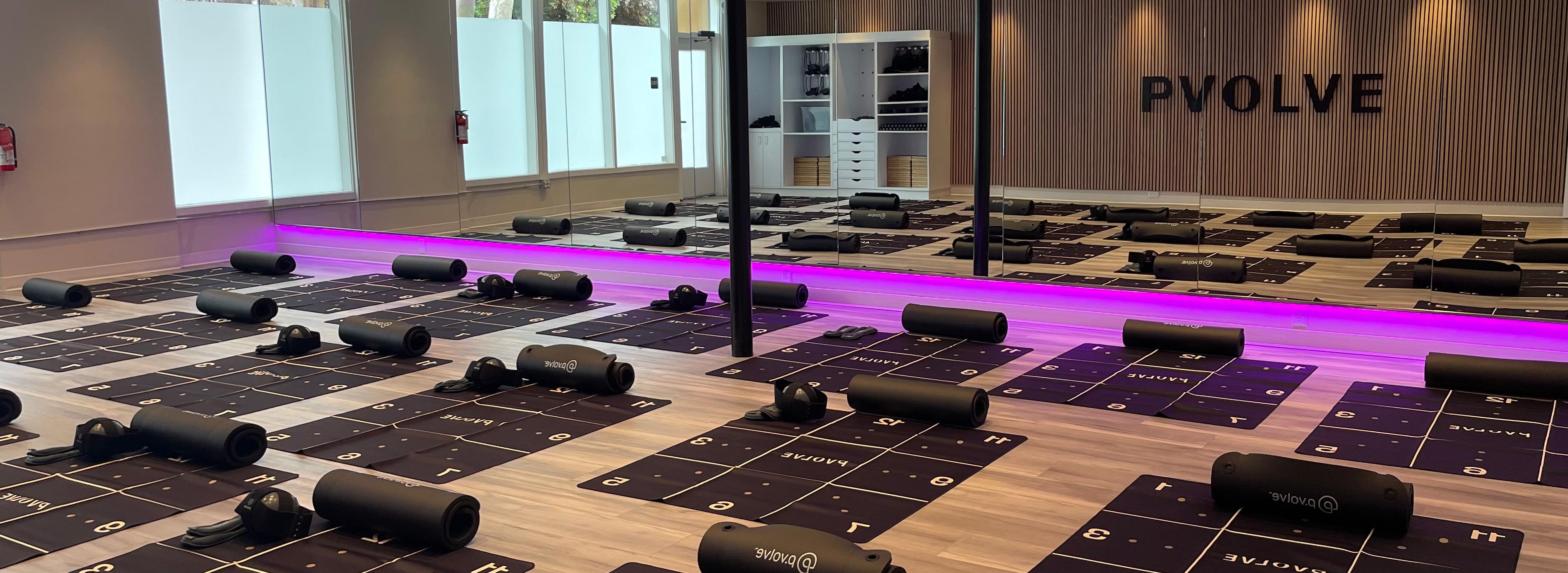
By Julie Cartwright, Pvolve
The $1.8 trillion wellness industry is evolving, and so are the expectations around fitness.
Today, people are looking for more than just a workout. They want movement that supports their strength, balance, mobility, and long-term health. They want fitness that meets them where they are and helps them move better through every stage of life.
Functional, sustainable fitness is stepping into that role because it’s a smarter way to build strength, improve stability, and support longevity. At Pvolve, this is the foundation of our method.
Strength training is having a welldeserved moment. It’s one of the most effective ways to support metabolic health, maintain mobility as we age, and improve overall quality of life. But traditional strength workouts — often centered around repetitive movements and heavy weights — can create barriers. For individuals recovering from injury, living with physical disabilities, or managing chronic pain, these routines aren’t just challenging — they can be inaccessible or even risky. That’s where functional, low impact strength training becomes essential. It opens the door for more people to build strength in a way that feels sustainable and supportive.
Our method at Pvolve brings a new
approach. We train the body using functional movement patterns, moving through all planes of motion to build total body strength. We then introduce our patented resistance equipment, which helps activate both large and small muscle groups. This creates a unique challenge that strengthens and sculpts while also improving posture, flexibility, and alignment.
These are not just visual or surfacelevel results. They are results that impact how people feel and move every day.
The wellness space is filled with bold promises. But today’s consumer wants more than inspiration. They want validation.
McKinsey’s latest Future of Wellness report confirms this, concluding that efficacy and scientific credibility are now among the top factors influencing wellness decisions. That’s why we’ve made clinical research a priority.
In an industry where historically only a small share of research has centered on women, we’ve prioritized changing that. Our focus is on developing fitness rooted in science, designed to support the real, physical needs of every body — at every stage of life.
For those looking to invest in the next generation of fitness, the landscape is shifting. Concepts that prioritize clinical efficacy, long-term results and personalized experiences are standing out in a crowded space for making fitness more inclusive, evidence-based, and sustainable for everyday life. With more than 20 studios open and over 50 in development, our expansion reflects a rising demand for purposeful, low impact fitness. People are seeking more than a high-intensity routine — they’re seeking a method that can support them for life.
The future of fitness is not just about how much you move. It’s about how well you move, how supported you feel and how long you can keep doing the things you love. Pvolve is proud to be part of this shift. As the industry continues to evolve, we’re focused on delivering real results, backed by real science, in a way that works for real people. Because it’s not just about moving more. It’s about moving better.

Julie Cartwright is the president is the Pvolve. For more information about IFA franchisor member Pvolve, please visit franchise.org/ franchise-opportunities/p-volve/.

By Amy Neary, Prime IV Hydration & Wellness
The wellness world is changing, and fast.
We’re seeing a cultural shift where consumers aren’t waiting to get sick before taking action. They’re leaning into prevention, recovery, and longevity. They’re investing in treatments that make them feel better now and perform better long-term. This evolution is driving demand for services like IV nutrient therapy, once considered niche and now becoming foundational in modern wellness.
When I founded Prime IV Hydration & Wellness in 2017, I knew we were entering a highpotential space. What I didn’t know was just how quickly it would move from a functional medicine health hack to a mainstream self-care routine. Today, with over 160 open spas and more than 250 franchise partners across 44 states, we’re seeing firsthand how deeply people are craving personalized, proactive care.
According to the Global Wellness Institute, the global wellness market is now worth over $5.6 trillion, and the fastest-growing segments are those centered on proactive, personalized care. IV therapy, peptides, hormone balancing, and other targeted modalities are no longer reserved for
elite athletes or biohackers. They’re being embraced by busy parents, teachers, first responders — everyday people looking to reclaim their energy, immunity, and health.
It’s one thing to create a powerful wellness experience in a single location — it’s another to replicate that across 200+ franchise units. We knew early on that scaling would require more than enthusiasm; it would require structure, systems, and serious commitment to consistency.
That’s why we’ve invested heavily in infrastructure. We expanded our corporate team, doubled the size of our Business Success department, and rolled out detailed onboarding, marketing, and operations training programs. We standardized our medical protocols to ensure quality and safety. And we built real-time performance tools to manage staffing, track KPIs, and deliver a guest experience that feels premium — no matter the location.
But the most important investment we’ve made? Our people. We’ve built a culture of transparency, responsiveness, and partnership. Our franchise partners are more than operators — they’re co-builders of our mission.
The future of wellness is integrative and datadriven. Clients don’t want one-size-fits-all care — they want solutions built around their biology, lifestyle, and goals. That’s why we’re expanding our offerings to include physician-prescribed peptides, NAD+, and BHRT (bioidentical hormone replacement therapy), which is currently being piloted in select locations. These aren’t wellness fads. They’re sciencebacked, physician-approved therapies with enormous potential to improve how people age, recover, and perform. And our team of medical advisors ensures that every protocol we offer meets rigorous safety and efficacy standards before it reaches our clients.
To other founders and franchise leaders entering the health and wellness space: this is not a trend. It’s a shift. But with that shift comes complexity — regulations, medical oversight, supply chains, and a very discerning customer base. My advice? Don’t rush scale. Build systems that last. Innovate when it counts. Protect your brand like your life depends on it. And always remember the human being on the other end of the treatment — whether that’s a client or a franchisee.

Amy Neary is the founder and CEO of Prime IV Hydration & Wellness. For more information about IFA franchisor member Prime IV Hydration & Wellness, please visit franchise.org/ franchise-opportunities/prime-iv-hydrationwellness/
We hear it every year: advertising is getting more and more expensive, while franchisors are left wondering how to reach revenue goals. To maximize their return, business owners need to understand if their marketing is working, why it’s working–or isn’t–and how to get more out of their marketing spend. Success may look different for every owner, but franchisors and franchisees seeing the most success know which marketing channels deliver revenue and maximize results.
While generating leads is important, it’s important to recognize that lead quality significantly impacts your bottom line. Focusing solely on cost-per-lead (CPL) provides an incomplete picture. To truly optimize your marketing spend, you need to understand:
ⅼ Lead Value: Which leads are most likely to convert into paying customers?
ⅼ Revenue Generation: Which leads ultimately drive the most revenue for your business?
ⅼ Return on Investment (ROI): Which marketing channels deliver the highest return on your investment?
By analyzing these factors, you can identify and prioritize high-value leads, ensuring that your marketing efforts are focused on attracting the right customers.
Integrating your marketing data with revenue data provides valuable insights into the ROI of each advertising channel. It’s important to consider that a higher CPL may sometimes be justified if the channel generates a higher volume of qualified leads or leads with a higher customer lifetime value.
For example, a channel with a lower CPL might generate a high volume of leads, but if those leads have a low conversion rate, the overall ROI may be lower than a channel with a higher CPL but a higher conversion rate.
By analyzing lead cost, conversion rates, and revenue generated by each lead, you can make data-driven decisions to optimize your marketing spend and drive revenue growth.
Marketing agencies delivering the most value for their customers are now leveraging technology to bridge the gap between marketing activities and revenue outcomes. By integrating marketing data with a franchise’s Customer Relationship Management (CRM) system, businesses gain a comprehensive view of their marketing ROI. For example, Scorpion offers a revenue dashboard and roll-up reporting that provides franchise businesses with valuable insights into the effectiveness of their marketing efforts. Scorpion integrates with leading CRMs, like ServiceTitan, to further enhance this capability by providing robust metrics and reporting.
Roxanne Conrad, Chief Operating Officer of Premium Service Brands, highlights the value of this integration: “The integration between Scorpion and ServiceTitan has been tremendously impactful for us.”
This one-of-a-kind partnership between Scorpion and ServiceTitan empowers franchise owners with a centralized view of their data, enabling them to make informed decisions and maximize their marketing strategies and investments.
By connecting marketing metrics with revenue data, you can gain a deeper understanding of your marketing performance and identify areas for improvement. This allows you to:
ⅼ Optimize Budget Allocation: Invest in the channels that deliver the highest ROI.
ⅼ Enhance Marketing Strategies: Refine your campaigns based on data-driven insights.
ⅼ Improve Operational Efficiency: Identify and address bottlenecks in the customer journey.
Courtney Spain, Director of Marketing at Premium Service Brands, emphasizes the transformative impact of this data-driven approach: “The partnership with Scorpion and ServiceTitan has really revolutionized the way that our franchisees have access to their metrics and their data.” By focusing on revenue generation and analyzing integrated data, franchisors can have greater transparency in performance, allowing them to create hyper-local marketing strategies for franchisees. This approach can make it easier to scale marketing efforts across locations and realize results.


By Michael Moorhouse, Mosquito Shield
According to a Salesforce survey, nearly 60 percent of the workforce claims they receive no workplace training.
This gap in essential education can lead to inefficiencies on the job, limited business growth, and, in some cases, property damage or personal injury.
Considering the possible risks associated with inefficient training, pest control companies must do everything they can to follow standard training practices. Well-trained teams yield more satisfied customers and more revenue, leading to exponential growth for franchise owners.
“
Well-trained teams yield more satisfied customers and more revenue, leading to exponential growth for franchise owners.”
Efficient training in the pest control industry needs to cover three areas of interaction: interaction with the public, interaction with the product, and interaction within the business
itself. Consistent training in these areas and crosstraining on other aspects of the business will maximize productivity and growth. Partnering with an established pest control franchise can give entrepreneurs a proven training framework that optimizes training procedures and sets them up for successful business interactions on day one. From training for field technicians to establishing operations, franchise owners have more support and guidance than they would when starting a non-franchised business.

A pest control franchise’s field technicians are often the only people that customers see. Without the proper training, customers may get the wrong impression of the company. A negative first impression
hurts repeat business and ultimately affects the franchise’s bottom line. Best practices established by franchisors guide franchise owners on how to train team members for client interaction by clearly teaching about the protocols surrounding:
• How and when to arrive on the job before they start working.
• How to accurately communicate the purpose of their visit.
• What language to use for potential upselling opportunities.
Those first interactions can make the difference between a one-and-done or lifelong customer for a franchise. When a team has all the information on what and how they need to communicate with the public, it opens the door for better customer relationships. And pest control franchisors can provide entrepreneurs with the relationshipbuilding tools that are the cornerstone of any service-based company.
Sending an untrained technician into the field could result in more than a negative brand impression — improper use of the chemicals and pest control tools can come with severe consequences. For example, improperly mixed formulas may result in harmful chemical exposure if mixed too heavily and may be ineffective if mixed too lightly, resulting in callbacks or refunded treatments.
Pest control franchises have years of proven success in managing products and know what business owners need to teach their teams for repeat success — a tool that isn’t readily available for non-franchised business owners. Implementing these training strategies minimizes potential issues by:
• Giving technicians the information they need to properly handle materials.
• Instructing team members on how to set up and run their equipment.
• Demonstrating where and when to treat a property to maximize effectiveness.
While some of these tasks may seem like second nature to seasoned veterans, new hires need the basics to achieve success. Efficient training on the product and procedures

ensures that company standards are being met and provides consistent service for customers, job after job.
For entrepreneurs looking to own a pest control company, joining a franchise can give them a jumpstart by having these ready-made strategies from the beginning.
“ From training for field technicians to establishing operations, franchise owners have more support and guidance than they would when starting a nonfranchised business.”
When team members don’t understand how to interact with each other, it causes bottlenecks and miscommunication that hinders progress. Entrepreneurs joining a pest control franchise are provided with proven operational guidelines that help them avoid these operational missteps. Some examples of internal training may include:
• How to manage work requests and workflow management software.
• Where to find information on upcoming jobs and inventory data.
• Who to contact when customers have questions they can’t answer.
Understanding the processes that make a franchise run more efficiently is crucial to achieving growth. When team members work in sync and take ownership of their positions, franchise owners can focus their efforts more on marketing their brand than solving internal issues.
Joining a pest control franchise gives entrepreneurs access to readymade training programs that empower teams and provide consistent results. These built-in strategies make it possible for franchises to hit the ground running with teams and operations training that work. It doesn’t matter if a new owner has decades of experience in the industry or is just starting on their entrepreneurial journey, the franchise training model helps drive opportunities for growth and financial freedom.

Michael Moorhouse is president of Mosquito Shield. Mosquito Shield, part of the Five Star Franchising platform of home service brands, was ranked the #1 franchise in pest control by Entrepreneur in 2023, 2024 and 2025. For more information about IFA franchisor member Mosquito Shield, please visit franchise.org/franchiseopportunities/mosquito-shield/
By Ron Shlien, The Mad Science Group

I was only 13 years old when I co-founded my first business, The Mad Science Group, decades ago.
What began as a passion for sparking curiosity in children has since evolved into a global franchise network. Over the years, I’ve come to understand how mission-driven businesses can transcend traditional profit motives to create lasting positive change in their communities. Today, that vision is more relevant than ever, as consumers and entrepreneurs alike are increasingly seeking businesses with purpose at their core.
Mission-driven franchises, like Mad Science, Crayola Imagine Arts Academy, and others, are not just focused on growth; they are deeply committed to making a difference. These brands have embedded social responsibility into their very fabric, integrating educational and creative experiences into their business “
Franchisors no longer solely measure success by profits but also by their ability to give back and create meaningful impacts.”
models. For example, Mad Science continues to ignite curiosity and foster creativity in children around the world, while Crayola Imagine Arts Academy nurtures self-expression through art, enabling young minds to explore their potential.
As our business landscape evolves, it’s clear that consumers are more likely to invest in brands that align with their values. The success of these franchises highlights a shift in how businesses approach community engagement. Franchisors no longer solely measure success by profits but also by their ability to give back and create meaningful impacts.
In my experience, the key to building a mission-driven brand is authenticity. Consumers and franchisees can quickly spot when a brand’s commitment to a cause is superficial. True mission-driven businesses build their reputation on genuine contributions, offering programs and services that make a real difference. At Mad Science, we’ve seen firsthand how our initiatives impact children’s lives — helping them develop problem-solving skills, ignite their curiosity, and build their self-confidence.
One of the most rewarding experiences I’ve had in this journey was watching a young student who participated in Mad Science’s programs years ago. This child was initially shy and hesitant, unsure of their abilities. But through the hands-on science experiments and the encouragement they received from our instructors, their curiosity was sparked. Over time, I witnessed this same student transform into a passionate advocate for environmental science. Today, they are studying to become a marine biologist, working on important projects related to ocean conservation. This kind of transformation —

“
When franchisees see the impact they’re making on local youth, families, and neighborhoods, it adds a level of fulfilment to their business that extends beyond the bottom line.”
where a child’s inspiration and newfound love for science evolves into meaningful contributions to society — is one of the most gratifying aspects of our work.
For franchisees, integrating a meaningful mission into their operations doesn’t just foster goodwill; it also creates deeper, more engaged relationships with their communities. When franchisees see the impact they’re making on local youth, families, and neighborhoods, it adds a level of fulfilment to their business that extends beyond the bottom line. For them, their work becomes part of a larger mission to make the world a better place, which can be incredibly rewarding.
Creating a successful missiondriven franchise is a process that requires dedication and time. It’s about more than just offering a service or product; it’s about making a lasting, positive impact that resonates across generations. Today’s consumers — especially younger generations — are more attuned to social responsibility than ever before, making it imperative for businesses to incorporate meaningful missions into their frameworks.
As a consumer, looking for mission-driven brands is an opportunity to support businesses that are actively working toward a better future. Whether it’s a franchise providing educational programs for children or one that supports local sustainability efforts, these brands are making a difference. By supporting mission-driven franchises, consumers can be part of a larger movement that encourages businesses to give back, help grow communities, and create lasting change.

For those looking to make a mark as franchise owners or investors, focusing on the purpose behind a business is a smart strategy. A franchise with a meaningful mission is more likely to build strong, loyal customer bases and have a lasting impact on its local community. The future of franchising is not just about profit — it’s about purpose. Ron Shlien is the co-founder and chief innovator of The Mad Science Group. For more information about IFA franchisor member The Mad Science Group, please visit franchise.org/franchise-opportunities/mad-science/

By Danny Horboychuk, The Brothers that just do Gutters
Let’s be honest — the contractor industry hasn’t always had the best reputation.
At The Brothers that just do Gutters, we’ve been gutter specialists from day one, driven by a simple dream: to be a community-loved contractor. Our mantra, “Reinventing Contractor Service™,” isn’t just something we put on business cards. It’s how we approach every single job, every single day.
“
The home services industry is changing fast, and homeowners’ expectations are higher than
ever.”
The home services industry is changing fast, and homeowners’ expectations are higher than ever. They’re done with unreturned calls, vague timelines, and that sinking feeling when they’re not sure if they’re getting quality work. As gutter specialists, we knew we had to do more than just provide excellent technical service — we had to reimagine the entire customer experience.
Every gutter project is unique and deserves to be treated that way. We shifted our focus from just completing jobs to creating exceptional experiences. This meant carefully selecting our product partners, investing heavily in employee training, and committing to complete transparency with our customers. We even made the bold choice to publish every single customer review — good or bad, typos and all. This transparency keeps us accountable and drives us to constantly improve.
The results? We’re not just gaining customers; we’re building relationships with friends and neighbors. When
a repair is needed, it becomes our top priority. When a product doesn’t meet our standards, we find a better solution. This commitment to excellence has helped us develop innovative methods never before seen in the contractor field.
The industry is also seeing a major shift toward preventative maintenance. Homeowners are getting smarter about protecting their investments, especially as weather patterns become more extreme. They’re looking for contractors who can help them avoid problems before they start, not just fix them after the fact.
This evolution in home services has created an exciting opportunity for entrepreneurs who share our vision. Through our franchise program, we’re extending our mission of reinventing contractor service to communities across the country. Our franchisees get access to our proven systems, comprehensive training, and years of specialized expertise — everything they need to deliver the kind of five-star service that turns customers into advocates.
“
Looking ahead, I believe the future belongs to contractors who can combine deep expertise with exceptional service.”
Looking ahead, I believe the future belongs to contractors who can combine deep expertise with exceptional service. The old way of doing things — poor communication, inconsistent quality, and a lack of transparency — just won’t cut it anymore. Homeowners are demanding
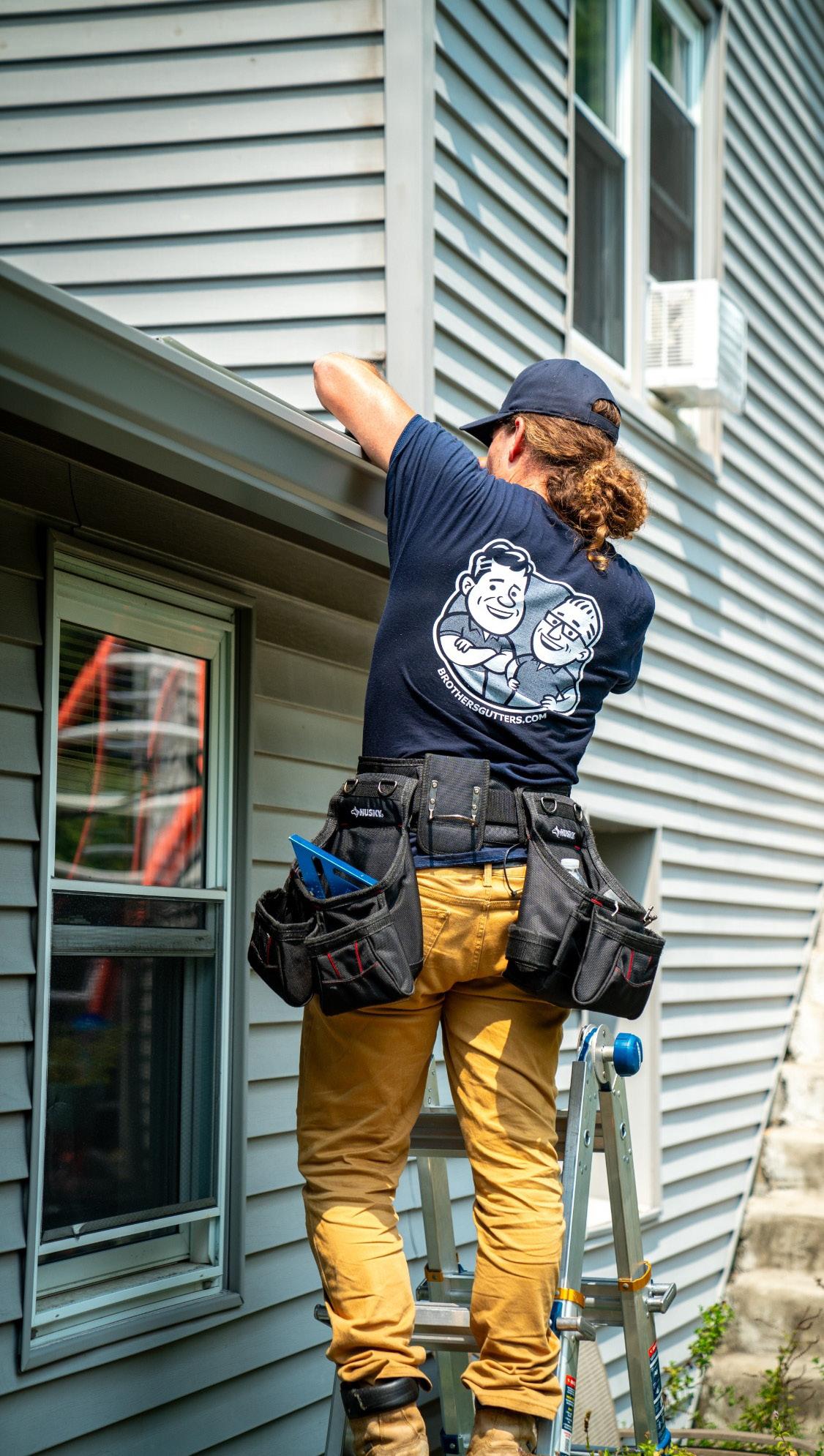
better, and contractors who can deliver on that demand will thrive.
At The Brothers that just do Gutters, we’re proud to be part of this transformation. We’re showing that it’s possible to reinvent how clients experience contractor services by focusing on every detail, investing in our people, and staying true to our community-first values.

Danny Horboychuk is the president of The Brothers that just do Gutters, a specialized home services franchise and member of Evive Brands. With his commitment to innovation and service excellence, Danny leads the brand’s mission of “Reinventing Contractor Service™” across the nation. Danny is passionate about expanding the brand’s impact through strategic franchise partnerships and supporting entrepreneurs with a proven business model. For more information about IFA franchisor member The Brothers that just do Gutters, please visit franchise.org/franchise-opportunities/ the-brothers-that-just-do-gutters/
By Evan Hackel, Ingage Consulting and Scott Weber, CFE, GolfSuites
The world around us evolves at a blistering pace — fueled by rapid technological advancements, shifting consumer behaviors, and regulatory changes. Yet franchise agreements remain largely frozen in time.

In the last 20 years, little has changed in the fundamental design of franchise agreements. This lack of evolution has left many franchisors struggling to adapt to today’s ever-changing environment, putting both their systems and their franchisees at risk. It’s time to view franchise agreements through a fresh, forward-thinking lens.
In this article, we’ll explore two major flaws in traditional franchise agreements and introduce innovative solutions that can better equip franchisors and franchisees to navigate modern challenges.
Franchise Agreements are Too Rigid
The current franchise agreement model locks franchisors into terms that remain unchanged for five, 10 years, or longer — essentially until the next renewal cycle. This creates a serious problem. In a business landscape where technological and
operational norms change virtually overnight, the inability to implement necessary updates leaves franchisors struggling to protect their brand, adapt to new opportunities, and maintain system-wide competitiveness.
Issues and disputes often arise when the franchisor charges fees for new technology, such as revised software, related to a new service. This in turn raises Item 6 disclosure issues. While there are some workarounds and counter-arguments, it is time to develop a better process.
Historically, most franchisors have resorted to using the operations manual to implement significant changes. However, this practice is increasingly under scrutiny from regulators and franchisee attorneys, who argue that changes not explicitly agreed upon in the franchise agreement may lack enforceability. The result? Franchisors are sometimes caught between a rock and a hard place.
Termination is often the only meaningful remedy available to franchisors when franchisees violate brand standards or the agreement itself. Unfortunately, termination is an extreme measure that benefits no one. For franchisees, it means the devastating loss of their business. For franchisors, it means lost royalty streams and costly legal battles. Moreover, termination is not altogether a quick remedy and may be further limited by state franchise relationship law notice and timing requirements. While termination may be necessary in severe cases, franchisors may seek more timely, effective, and better tools to address non-compliance that, while providing

certain benefits to the franchisor and franchise system in general, can have significant and often catastrophic economic consequences to the franchisee. The goal is to swiftly and effectively ensure all franchisees “play by the same rules” to maintain brand strength.
One of the most significant innovations we propose is a system that allows for amendments to the franchise agreement with majority franchisee approval.
Here’s how it works: Add a clause to your franchise agreement stating that amendments can be made if both the franchisor management and at least 60 percent of franchisees agree to the proposed change.
This mechanism ensures that certain types of updates are not unilaterally imposed by the franchisor. It empowers franchisees to have a voice in specific types of system-wide decisions while allowing franchisors to remain agile by adjusting system standards with respect to other types of changes needed. In addition, this change could address necessary changes to the franchise relationship which are already carved out from the system standards process by the terms of the existing franchise agreement. In doing so, such a clause would not replace the traditional franchise agreement update that is part of the renewal process but would provide an additional tool for implementing necessary changes without waiting years.
Benefits:
• Franchisors can respond quickly to industry changes.
• Franchisees feel empowered, as their agreement reflects a system of collaboration.
• The entire franchise system operates with greater alignment and adaptability.
When drafting this part of the franchise agreement, it is important to take great care not to limit current rights to make changes in the operations manual or brand standards, particularly those that promote nimble adaptation to changing market conditions and operating methods. Franchisors would not want to invoke the need to have a franchisewide vote on every little change; franchise-wide approval only applies to difficult-to-implement changes to the franchise agreement itself that the franchisor is unable to make. Both methods take time. A third method is to require this modification as a condition for curing any existing default. Nonetheless, for franchisees who do not agree to the modification nor are required to consent to it to cure default, the existing terms of their franchise agreement would remain in effect until renewal.
To address the issue of enforcement, we propose a progressive rehabilitative non-compliance fee system as an alternative to immediate termination or notice thereof. This system is designed to encourage compliance and to remedy the local and system-wide impacts of noncompliance, all while maintaining fairness for franchisees and protecting the franchisor’s ability to enforce brand standards. Here’s the structure (using $1,000 for example only):
• A rehabilitative fee of $1,000 is imposed for the first month of non-compliance.
• The fee increases by $1,000 each subsequent month, week or day until the violation is resolved, depending on the type of non-compliance.

• The franchisor retains the option to terminate the franchise if violations are not corrected after repeated notices or if the fee is not paid in a timely way.
Noncompliance fees are imposed to fund franchisee compliance training efforts and to mitigate the damages caused by noncompliance. It’s important to use the term “fee” versus “penalty,” as the two terms have significant legal distinctions. This system creates a transparent and manageable consequence for non-compliance, as well as an initial remedy for that non-compliance. The escalating (progressive) nature of the fee provides strong motivation for franchisees to correct issues quickly and addresses the likelihood that harm increases as such non-compliance remains unremedied, without forcing franchisors to resort to termination prematurely.
For this system to work, it’s critical that the fees do not create a perception of franchisors profiting from enforcement. To avoid this, all fees collected should be directed to:
1. Specific system standards or operations training for the franchisee in question.
2. A national advertising fund to further benefit the entire system; or
3. Local or regional advertising.
4. A fund to mitigate damage done on a more localized basis.
5. A specific purpose to mitigate specific damages in question.
6. To reimburse the franchisor and even perhaps other franchisees for lost profits caused by such noncompliance, in such a manner that the franchisor does not make a profit.

By doing so, franchisors demonstrate that the goal of enforcement is to maintain brand standards as well as to educate errant franchises that their actions or inactions have consequences not only to the franchisee, but to others in the system — not to boost profits. This approach helps build trust and ensures compliance initiatives are viewed as fair.
Not every situation is black and white. Recognizing that some franchisees may have legitimate reasons for requesting exceptions to certain brand standards, we recommend establishing a Variance Committee to evaluate requests.
• The committee consists of either three or five franchisees in good standing, selected by management or the Franchise Advisory Council.
• Committee members are adequately trained on legal issues, specifically around fairness, terms of the franchise agreement and system standards with the goal of avoiding bias, to ensure that decisions are made fairly and for the benefit of the franchise system.
• Franchisees submit formal variance requests for review.
• The committee votes within one week of receiving the request, although for some variance the timing may change due to necessity.
• If the request is denied, franchisees can appeal the decision and present their case to the committee via a video conference, ensuring a fair
and transparent review process.
• The franchisor or its legal counsel may veto due to legal operational or legal concerns if necessary.
This process adds transparency and fairness, reducing perceptions of bias while ensuring variances are granted sparingly and with good reason.
Modernizing franchise agreements with these tools — flexible amendment clauses, progressive penalties, and transparent variance processes — will revolutionize the way franchisors and franchisees work together.
• Agility: Franchisors can adapt to new technologies and regulations without waiting for renewal cycles.

• Fairness: Franchisees have a voice in changes and a clear, manageable system for compliance.
• Alignment: Everyone in the system benefits when compliance increases, brand strength grows, and trust deepens.
Implementing these changes requires a full cycle of franchise agreements, so it’s critical to start now. Waiting means further delays in addressing challenges that are already impacting your system.
By rethinking the franchise agreement, you’re not just preparing for the future — you’re building a stronger, more resilient franchise system today.
Franchising has always been about partnership. Let’s ensure our agreements reflect the same spirit of collaboration, innovation, and fairness that define the most successful franchises. The time to rethink franchise agreements is now.

Evan Hackel is the CEO of Ingage Consulting, Delta Payment Systems, and an advisor to The Learning Network. As author, speaker and entrepreneur, Evan has been instrumental in launching more than 20 businesses and has managed a portfolio of brands with systemwide sales of more than $5 billion. He is the creator of Ingaged Leadership, is the author of the book “Ingaging Leadership: The Ultimate Edition” and is a thought leader in the fields of leadership and success.

Scott Weber, CFE, has been a franchise attorney for more than 27 years, has been a multi-unit franchisee, principal owner of several franchisors, and founder of several other businesses, including suppliers to franchise systems. He recently served as the chief legal officer of Hooters, and currently serves as one of its board members. Scott is a founder and partner of the Moon Mountain Café system, and is the CEO of GolfSuites Franchising, which is developing a franchise program for the GolfSuites’ outdoor range and indoor golf entertainment bar and grill concepts.
IFA's preferred vendors o er franchisors and franchisees products and services to advance their brands.
AnswerConnect is an industry leader in live reception services, o ering complete support for your entire franchise system—whether it’s franchise development or individual franchisees. Available 24/7/365, AnswerConnect expertly handles calls, sets appointments, qualifies leads, transfers calls, integrates with CRMs, and much more. www.answerconnect.com/franchise


As the authority in franchise funding, Benetrends has been funding America’s most popular brands for 40 years. Benetrends' innovative and comprehensive suite of funding solutions not only helps franchisees successfully launch their dreams, but also helps catapult growth of franchise systems. www.benetrends.com
Constant Contact simplifies digital marketing for franchisors with an all-in-one platform for email, social, landing pages, and more. Whether you’re an emerging franchise or an established system, our platform empowers franchisors to decide how much control to maintain at the top while giving franchisees the flexibility they need for local marketing success. www.constantcontact.com/partners/franchise
Paychex is a leading provider of integrated human capital management solutions for payroll, benefits, human resources, and insurance services. We’re a digitally driven HR leader on a mission to help franchise businesses succeed by making complex challenges brilliantly simple. www.paychex.com/franchise


Scorpion is the leader in helping franchises succeed by focusing on what truly matters—driving revenue. Our digital marketing solutions support your network every step of the way, helping tell your story online, attract more of the right customers, and turn those opportunities into measurable results. www.scorpion.co/ifa
By Mark D. Nichols, Esq., United Franchise Group


There are laws to protect your customers’ sensitive information, but it’s still up to you to keep their data safe.
Data privacy has been a concern for consumers since well before 2016, when the European Union passed the General Data Protection Regulation (GDPR), but the law was rightly hailed for beginning a new era in consumer protection. The U.S. is trying to keep up, but privacy laws can vary. They’re still a patchwork even with a concerted effort by some states, including California, Virginia and Colorado, to pass “mini-GDPR laws.” States are also starting to draft and pass legislation relating to the governance of artificial intelligence. But privacy laws can’t keep thieves and hackers from accessing your customer’s information. Thousands of major data breaches have been reported since 2016; in the third
quarter of 2024 alone, data breaches exposed more than 422 million records worldwide, according to the research site Statista. It’s critical for franchisors and franchisees to have security measures in place to protect customer information and prevent operational, financial, and reputational damage to the company.
A data breach is like a nick on a pane of glass that quickly turns into a crack slicing its way to the bottom until the glass shatters. First, sensitive customer and business information is compromised, disrupting operations while security issues are resolved, and steps are taken to heal customers. This
can damage the franchise’s reputation, causing a loss of customer trust and reducing sales. Ultimately, the business may face legal and financial consequences, including fines and increased costs for cybersecurity measures, which can strain resources and hinder operational efficiency.
If franchise locations use a centralized customer database, payment processing system or cloud-based storage, a breach at one location could expose data across multiple locations.
This affects all franchise categories, but the risks can vary greatly depending on things such as the type and sensitivity of the compromised data, the size and scope of the business and whether appropriate protocols are in place to respond quickly and mitigate any damage.
If you do business with EU citizens or in states adopting data privacy laws, you must follow strict
procedures to help keep customer data out of the wrong hands. In the case of the GDPR, this includes getting customers’ explicit consent to use sensitive data like date of birth and Social Security Number. You must have a specific reason for collecting the data and cannot use it for other purposes. Customers have the right to correct inaccurate data or delete everything altogether, even if it’s accurate. The law also requires companies to implement strong security measures. In a breach, they must notify regulatory authorities and affected customers within 72 hours. The GDPR requires businesses to keep records of data processing activities and may require them to appoint a data protection officer. Non-compliance can result in a fine of up to four percent of global revenue.
Even if you’re not covered by these regulations, you need to enact some basic security measures to minimize the chances of a breach. Franchisees should take these steps, at a minimum:
• Train your employees on data privacy. Limit and control their access to sensitive data.
• Enforce multi-factor authentication for business accounts.
• Keep software, POS systems and firewalls updated to protect against vulnerabilities.
• Maintain separate personal and business devices. Keeping business data on a dedicated device reduces the risk of exposure from personal apps, social media or potential malware on a personal phone. Business phones can be configured with stricter security
measures, such as encryption and remote-wipe capabilities.
• Follow the franchisor’s guidelines for data privacy.
“
It’s critical for franchisors and franchisees to have security measures in place to protect customer information and prevent operational, financial, and reputational damage to the company.”
The franchisor should consider taking these steps:
• Train franchisees on data privacy and have policies in place in the operations manual. Include compliance training on relevant regulations and hands-on system training. Employees should demonstrate they can securely handle customer data in POS systems, CRM platforms and other business tools. To increase training opportunities, offer webinars and online modules.
• Create breach response plans, including reporting procedures and mitigation steps.
• Maintain emergency contact lists with clear guidelines on when and how to contact the franchisor’s cybersecurity team.
• Provide clear data security policies, including password management, secure transactions and breach response protocols. Define proper handling of customer and employee data, ensuring compliance with franchise and legal requirements.
• Conduct regular compliance audits. Have franchisees complete periodic security assessments, as well as phishing and cybersecurity drills.
• Ensure that third-party vendors comply with data protection policies.
It feels as though technology changes by the day, and data privacy protocols must keep up. Staying active with industry groups, particularly those that have a legislative committee or lobbying committee, is one of your best practices. Franchisees should speak with their insurance agent about getting cyber insurance with limits that make sense for the size of the business. Franchisors should also have cyber insurance protection. Above all, be clear and straightforward. Be sure your employees know and follow the systems you’ve put in place, and if a breach does occur, customers will want to be dealt with honestly and transparently. Not doing so will damage your reputation far more than any hacker could.

Mark D. Nichols, Esq. is general counsel for United Franchise Group™, home to an affiliated family of brands and consultants with over 1,800 franchises in more than 80 countries.
Sources:
• Bloomberg Law: U.S. data privacy laws vs. GDPR, https://pro. bloomberglaw.com/insights/privacy/ privacy-laws-us-vs-eu-gdpr/#thebasics-of-each-law
• Statista: 42 million data breaches in Q3 2024, https://www.statista.com/ statistics/1307426/number-of-databreaches-worldwide/

The International Franchise Association is proud to celebrate our franchisee members. See below to learn more about some of our Featured Franchisees — why they got into franchising, their unique backgrounds and how they contribute to their local communities.

Kristi started her career at Waxing the City straight out of school, quickly realizing her passion for the industry. With mentorship from the owner of the St. Cloud, Minnesota location, she transitioned into a management role, learning the ins and outs of running a business. When the owner decided to retire, Kristi seized the opportunity to take the next step — becoming a franchise owner herself. Today, she owns two locations with a third in development. Within each studio, she remains dedicated to fostering the company’s strong culture, with most of her employees staying for more than five years.
Kristi’s journey from Cerologist to owner allowed her to gain a comprehensive understanding of the brand, its services, and the industry as a whole. Her strategic yet bold jump to becoming an owner was a smooth transition due to her extensive experience in management for the location. She is truly an inspiration for both potential franchisees and current employees of Waxing the City who may have an interest in becoming a business owner. Entrepreneurial stories like Kristi’s have accelerated Waxing the City’s growth, with 73.5 percent of their new franchise agreements in 2024 being multi-unit deals in the trending health and wellness industry.
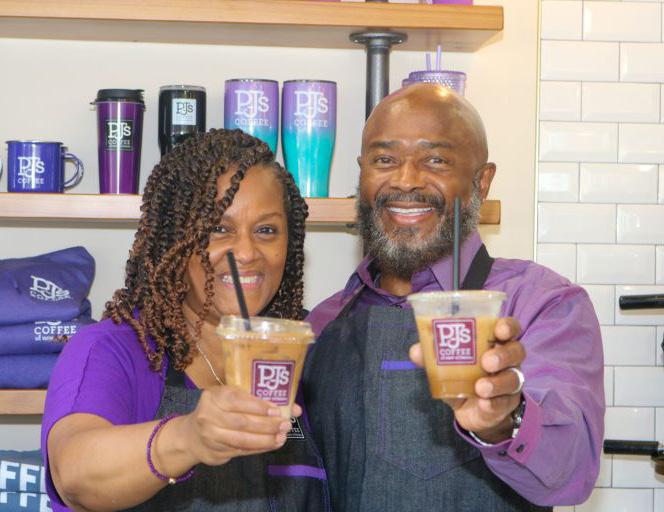
Rob and LaWanda Smith are turning their passion for leadership, community, and great coffee into their newest venture of owning a PJ’s Coffee franchise in Brandywine, Maryland. Rob, a proud U.S. Navy veteran, spent years honing the leadership, teamwork, and operational management skills that have defined his career. His ability to build and nurture high-performing teams has been a cornerstone of his success. Now, he’s bringing that same approach to his PJ’s Coffee business alongside his wife, LaWanda, who has more than 35 years of experience in retail and banking leadership.
The Smiths were initially drawn to PJ’s Coffee because, to them, coffee is more than just a drink – it’s a culture, a ritual, and a way to bring people together. As they learned more about PJ’s and the franchising opportunity, they fell even more in love with the brand, recognizing how its values aligned with Rob’s own. In 2023, his dedication and vision were recognized when he was awarded PJ’s Veteran’s Franchise License Giveaway, an honor that set him on the path to fulfilling a lifelong dream of business ownership.
Rob and LaWanda are excited to build a legacy, not just for themselves, but for their family. Their two sons will have the chance to see firsthand what it takes to run a successful business, instilling in them the values of hard work, dedication, and entrepreneurship. With their first PJ’s Coffee location opening in Prince George’s County and more on the way, the Smiths are eager to create a welcoming space where coffee and community come together.

Jordan and Jolie have grown multiple thriving FASTSIGNS centers in Texas. Before becoming successful business owners, they met at Baylor Law School and practiced law. Jolie focused on business law, and Jordan concentrated on estate planning and probate. Wanting to get out of the legal profession, they looked into franchising. They were drawn to the B2B business model where they could be creative, growth-oriented and have their weekends free for their growing family. Jolie was 6 months pregnant with their middle child when they made the jump into franchising, and their third child was born just 2 years later.
The Cyperts have continued to grow their business since initially purchasing three centers in 2015, which they did by intention. They desired a more managerial, multi-unit model and liked the network, support and flexibility that FASTSIGNS provided. They later built a production center and moved their Cedar Park center in 2021, then added their 4th center in June 2023.
In the day-to-day operations, Jolie is centered as the CEO role and focuses on strategy and sales management. Jordan, who excels at problem-solving and creativity, ensures the team stays ahead of the curve with production capabilities and efficiencies. Known for positivity and a constructive mindset, they mentor new franchisees, foster a positive team culture, and invest in staff training. They actively work to build upon and refine best practices and systems, participate in pilot programs, integrate technologies, and have developed a state-of-the-art main location. Their leadership extends to serving on separate board groups and the FASTSIGNS Franchise Advisory Council.

As a couple in their early 30s with young children (four kids under six at one point!), Melanie and John Ludden were working long hours as a registered nurse and a technology consultant & product manager, respectively. They were unsatisfied with the endless corporate grind and looked for a path to create financial independence and reclaim their time for more freedom and flexibility. Melanie and John were passionate about hospitality — helping people transition to the next step in their lives and careers — and real estate, having experience running an Airbnb in Washington, D.C.
They started researching rental properties, and during that discovery process, they met another couple who were already successful multi-brand franchisees and were building out MY SALON Suite locations. In early 2019, the two couples partnered and started building out their first location in Charlotte, NC, which opened in May 2020. Fast forward to March 2025, they now own five MY SALON Suite locations in Charlotte and are under construction on the sixth, with more planned for the coming years. They also own two locations in Columbia, SC, with another partnership, and are currently building the third location there.
Melanie and John didn’t go looking for a franchise, but franchising found them. It provided the path for them both to leave corporate America and become full-time franchisees and small business owners. It’s hard work and sometimes long hours, but it has been an incredibly rewarding journey for their family life — the kids affectionately call it the “family business” — and for their beauty, health, and wellness professional customers they call Members. Melanie and John continue to grow because they love the franchise and the value they can create for the community.

Vernon Davis’s transition from NFL star to business owner was a natural progression in his pursuit of greatness. Known for his discipline and work ethic, Davis found a perfect match in Jamba, a brand that shares his dedication to wellness and excellence.
Partnering with franchise veteran Matt Leary, Davis aims to foster a winning culture in their Jamba locations. Leary’s decade of franchise experience ensures strong operations and community engagement, while Davis’s leadership skills inspire the team, making their business relationship dynamic and effective.
“A true champion strives to achieve greatness and inspires it in others,” said Davis. “Leading a team of champions at our Jamba stores brings me the same pride and fulfillment as scoring a game-winning touchdown.”
Focusing on team development and community engagement, leveraging Jamba’s support systems, and seeking guidance from seasoned franchise operators, Davis has built a thriving portfolio of three Jamba locations in California.
Davis’s competitive drive and leadership demonstrate that success in franchising, like in football, comes from perseverance, collaboration, and a commitment to elevating others.
LEGAL SYMPOSIUM
May 4-6, 2025 | Washington, DC
IBA/IFA JOINT CONFERENCE
May 6-7, 2025 | Washington, DC
THE IFA WORLD FRANCHISE SHOW
May 9-10, 2025 | Miami, FL
Partnership event with Fortem International
FRANCHISE CUSTOMER
EXPERIENCE CONFERENCE
June 24-26, 2025 | Atlanta, GA
Partnership event with Franchise Update Media
IFA ADVOCACY SUMMIT
September 15-17, 2025 | Washington, DC

FRANCHISE LEADERSHIP AND DEVELOPMENT CONFERENCE
October 7-9, 2025 | Atlanta, GA
EMERGING FRANCHISOR CONFERENCE
November 10-12, 2025 | Nashville, TN
IFA ANNUAL CONVENTION
February 22-25, 2026 | Las Vegas, NV
MULTI-UNIT FRANCHISING CONFERENCE
March 24-27, 2026 | Las Vegas, NV
INTERNATIONAL FRANCHISE SHOW - LONDON
April 17-18, 2026 | London, England


After graduating college in 2019, Victor Lee was unsure of where his professional path would take him. While trying to decide what the next chapter would entail, Lee turned to his list of 10 life goals that he wrote during his undergraduate time at Dartmouth College — one of which was to open a school. With a passion for entrepreneurship and education, his goal became a reality in 2021 when he purchased his first Code Ninjas location in Sudbury, Massachusetts. Lee went on to expand his Code Ninjas portfolio after opening his second dojo in Northborough, Massachusetts in 2023.
Lee, who moved to the U.S. from South Korea in second grade, comes from a family of academics. His mother graduated from Ewha Womans University — the first university and graduate program for women in Korea — and his father earned his degree from Seoul National University. Today, he continues to draw inspiration from his teachers, especially Ms. Chung, his third-grade teacher, who once gave a one-word description of Lee — fair. Since then, he has made a conscious effort to live up to that description — first on the playground, and now in business.
These moments remind Lee of the profound, lifelong impact even small words from teachers can have on a child. The decision for Lee to invest in the future of coding was simple, as it allows him to merge his passion for education and business while technology continues to shape society’s future. As a young entrepreneur, Lee’s commitment to continuous learning has been key to his success in business ownership — affirming that investing in Code Ninjas’ franchise opportunity was the right move.

David and Lisa Ware’s journey to franchising was born from a shared love of food and hospitality. David, having grown up in a family catering business, always valued the connections forged over meals. His professional background in government contract consulting equipped him with a strong business acumen. During frequent work trips, David became a dedicated fan of East Coast Wings + Grill. Lisa, intrigued by his enthusiasm, made a two-hour drive to experience it herself — and she was immediately hooked.
The couple saw an opportunity to turn their passion into a business. Drawn by the brand’s operational support, proven model, and community-oriented approach, they decided to open their own location in Manassas, Virginia. As first-time franchisees, David and Lisa leaned on their complementary strengths: David’s strategic mindset and Lisa’s hands-on management style.
With their first location recently opened, the Wares are thrilled to have brought East Coast Wings + Grill’s signature hospitality and crave-worthy menu to their community. For them, franchising isn’t just a business venture, it’s a chance to create memorable experiences and foster local connections.

IFA’s political action committee, FranPAC, supports pro-franchise, pro-business candidates for U.S. Congress.
42,000 (22%)
(78%) Democrats
Aaron Bean FL004 Republican 2500
Ed Case HI001 Democratic 2500
Lou Correa CA046 Democratic 1000
Don Davis NC001 Democratic 5000
Tom Emmer MN006 Republican 5000
Brett Guthrie KY002 Republican 1000
Kevin Hern OK001 Republican 5000
Ashley Hinson IA002 Republican 1000
Mike Johnson LA004 Republican 30000
Trent Kelly MS001 Republican 1000
Kevin Kiley CA003 Republican 1000
Julia Letlow LA005 Republican 2000
Ryan Mackenzie PA007 Republican 5000
Lisa McClain MI010 Republican 5000
Rich McCormick GA006 Republican 2500
Scott Peters CA050 Democratic 1000
Hillary Scholten MI003 Democratic 5000
Jason Smith MO008 Republican 5000
Lloyd Smucker PA011 Republican 5000
Pete Stauber MN008 Republican 5000
Haley Stevens MI011 Democratic 5000
Beth Van Duyne TX024 Republican 5000
Tim Walberg MI005 Republican 5000
Tony Wied WI008 Republican 1000
Dan
John Thune
Roger
Congressional Campaign Committee
Franchisors
1Heart Caregiver Services
Encino, CA
Contact: Mr. Dylan Sambuceti https://1heartfranchise.com/
Autism Care Therapy Lombard, IL
Contact: Ms. Shaden Kassar https://autismcaretherapy.com/
Big Blue Swim School Chicago, IL
Contact: Mr. Chris DeJong www.bigblueswimschool.com
Chaiiwala
Leicester, UK
Contact: Mohsin Gandhi chaiiwala.co.uk
Fas-Tes Franchise Systems LLC
Fastest Labs
San Antonio, TX
Contact: Mr. David Claflin http://www.fastestlabs.com
Hyper Kidz
Clarksville, MD
Contact: Chinnababu Gudapati www.hyperkidzplay.com
Oxi Fresh Franchising Co.
Lakewood, CO
Contact: Mr. Jonathan Barnett http://www.oxifresh.com
PASTANITO
York, PA
Contact: Toni Calderone https://www.ownapastanito.com/
Property Sellwise Franchise
South Jordan, UT
Contact: Brandy Hoffman https://franchise.propertysellwise.com/
Pure Glow Franchise Co.
Natick, MA
Contact: Lauren Rampello Becotte www.pureglow.com
Statemint Franchising, LLC
Powell, TN
Contact: Sarah McAffry statemintconsignment.com
The Vital Stretch
Norwalk, CT
Contact: Melissa Goldring https://thevitalstretch.com/
Application. Applications may be completed online at franchise.org/cfe
Acceptance.
Applicants will receive email notification regarding acceptance of CFE candidacy and next steps to launch your CFE journey.
Acquire credits.
You will be provided with a CFE Getting Started Guide that explains the program requirements and details for selecting the education courses that best fit your schedule and goals.

Program
Program requirements can be satisfied through a combination of professional franchise experience, approved event participation, and authorized education courses.


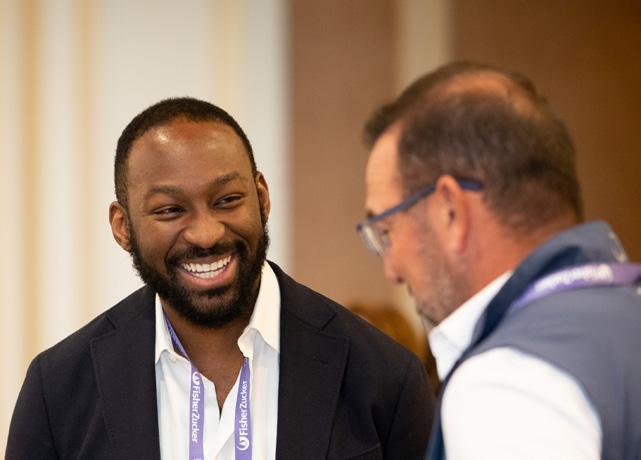





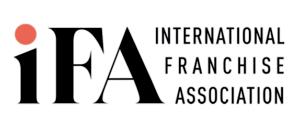
Entrepreneurs and franchisees deserve a funding partner who not only provides capital but genuinely believes in their vision. At Benetrends, we’re committed to working together to fund dreams, foster growth, and fuel success.
At Benetrends Financial, we take pride in our role as a trusted partner in franchising. With over 40 years of expertise and as the IFA's preferred funding partner, we’ve empowered thousands of entrepreneurs to achieve their dreams through innovative funding solutions tailored to their unique needs.
Our offerings include 401(k) Rollovers as Business Startups (ROBS), SBA loans, Business Plans, Incorporation Services, Fleet Financing, and more to help businesses thrive.
We believe that success in franchising is built on strong partnerships and shared goals. That’s why we work closely with franchisors, consultants, and brokers to deliver seamless and
effective funding experiences. Whether you are launching a new business or expanding an established brand, Benetrends is here to provide expert support every step of the way.
With a commitment to excellence and a genuine passion for empowering entrepreneurs, we deliver "Faster Funding, Better with Benetrends."
Let’s work together to drive growth, support innovation, and build the future of franchising.

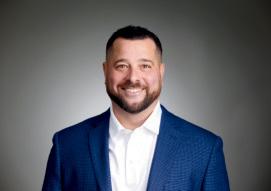
Michael Minitelli Chief Development Officer mminitelli@benetrends.com
(908) 447-0098

